
















FEBRUARY 14, 2025
VOLUME 34 • NUMBER 9
1123 S. CHURCH ST. CHARLOTTE, N.C. 28203-4003 catholicnews@rcdoc.org
704-370-3333
PUBLISHER
The Most Reverend Michael T. Martin, OFM Conv., Bishop of Charlotte
INDEX
Contact us 2
EDITOR: Trish Stukbauer 704-370-3335, tmstukbauer@rcdoc.org
ADVERTISING MANAGER: Kevin Eagan 704-370-3332, keeagan@rcdoc.org
HISPANIC MEDIA MANAGER: César Hurtado 704-370-3375, rchurtado@rcdoc.org
MULTIMEDIA DESIGNER: David Puckett 704-808-4521, dwpuckett@rcdoc.org
EDITORIAL TEAM: Kimberly Bender 704-370-3394, kdbender@rcdoc.org Lisa Geraci 704-370-3294, lmgeraci@rcdoc.org Troy C. Hull 704-370-3288, tchull@rcdoc.org Christina Lee Knauss 704-370-0783, clknauss@rcdoc.org
COMMUNICATIONS ASSISTANT/CIRCULATION: Amelia Kudela 704-370-3333, catholicnews@rcdoc.org
COMMUNICATIONS DIRECTOR: Liz Chandler 704-370-3336, lchandler@rcdoc.org
ASSISTANT COMMUNICATIONS DIRECTOR: Patricia L. Guilfoyle 704-370-3334, plguilfoyle@rcdoc.org
THE CATHOLIC NEWS HERALD is published by the Roman Catholic Diocese of Charlotte 26 times a year.
NEWS: The Catholic News Herald welcomes your news and photos. Please e-mail information, attaching photos in JPG format with a recommended resolution of 150 dpi or higher, to catholicnews@rcdoc.org All submitted items become the property of the Catholic News Herald and are subject to reuse, in whole or in part, in print, electronic formats and archives.
ADVERTISING: Reach 165,000 Catholics across western North Carolina! For advertising rates and information, contact Advertising Manager Kevin Eagan at 704-370-3332 or keeagan@rcdoc.org. The Catholic News Herald reserves the right to reject or cancel advertising for any reason, and does not recommend or guarantee any product, service or benefit claimed by our advertisers.
SUBSCRIPTIONS: $17.25 per year for registered families of the Diocese of Charlotte and $25 per year for all others
POSTMASTER: Periodicals Class postage (USPC 007-393) paid at Charlotte, N.C. Send address corrections to the Catholic News Herald, 1123 S. Church St., Charlotte, N.C. 28203.
Giving candy for Valentine’s Day? Consider sweets with Catholic roots. Lots of people know that Ferrero Rocher makes a decadent chocolate hazelnut candy, but fewer know that the candy and its creator have close ties to our faith. Michele Ferrero, the company’s founder and a devout Catholic, had a deep devotion to the Blessed Virgin Mary and wanted to honor her through his work. It is reported that he named his company “Rocher” after the rock grotto, the Rocher de Massabielle, which marks the location where the Virgin Mary appeared to St. Bernadette in Lourdes, France. It was said that Ferrero made annual pilgrimages to Lourdes and organized a visit for his employees. He also had a statue of the Virgin Mary in each of his company’s 14 production facilities around the world. Ferrero passed away on Feb. 14, 2015, at the age of 89, but his delicious legacy lives on in his family-run business.
Flowers are a staple of Valentine’s Day, but why not add a spiritual bouquet to your beloved’s gift? This meaningful Catholic tradition involves saying prayers or performing acts of mercy, charity or devotion offered on behalf of someone else or for their intentions.
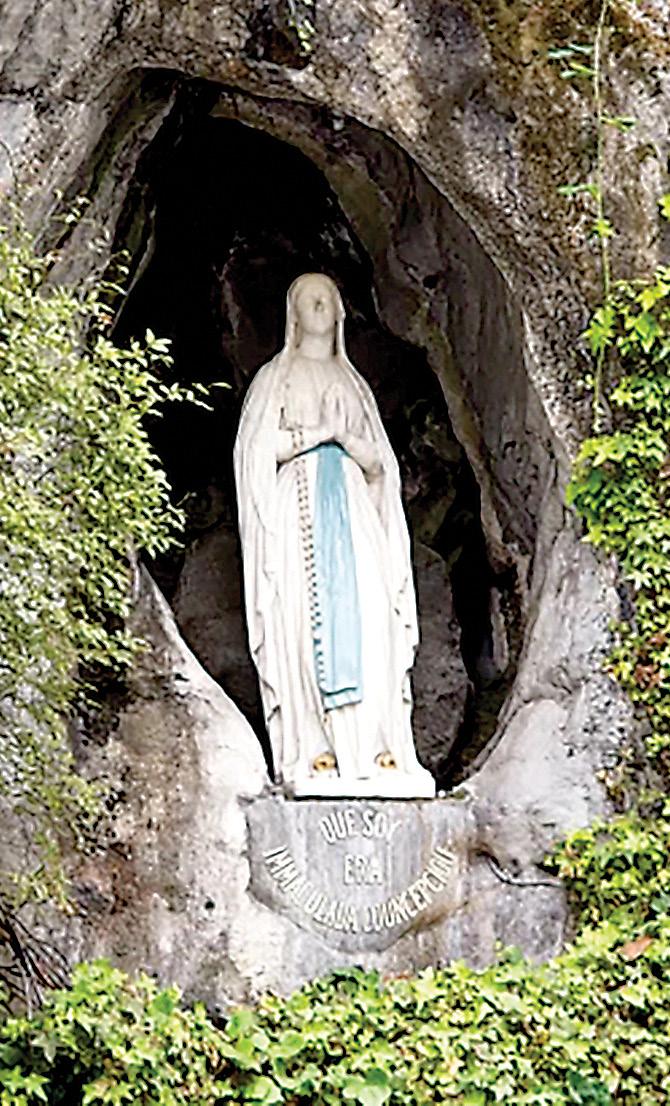

VIGIL OF THE TWO HEARTS : St. Patrick Cathedral hosts a vigil to honor the Hearts of Jesus and Mary, each first Friday through first Saturday. Mass will be at 8 p.m. Friday, March 7, followed by an overnight Adoration that ends with a Mass at 8 a.m. Saturday, March 8. Sign up at www.prolifecharlotte.org/two-hearts.
HEALING MASS: Mass with sacrament of anointing of the sick, 10 a.m. Saturday, March 8. St. Luke Church, 9800 Fairview Road, Mint Hill. Anointing is provided to those who need healing from physical or mental illness, or who will be undergoing surgery. Sponsored by the parish’s HOPE Committee. For details, call Mary Adams at 704-545-1224.
LIVING STATIONS OF THE CROSS Join young people from the Charlotte and Salisbury vicariates of the Diocese of Charlotte for Stations of the Cross, 6-8 p.m. Friday, March 14, at Holy Trinity Middle School, 3100 Park Road, Charlotte. RSVPs are requested. For details, see the events page of www.charlottediocese.org.
RITE OF ELECTION : Special liturgies for people on the journey to joining the Catholic Church will be held at the following churches: noon Saturday, March 15, St. Barnabas Church, 109 Crescent Hill Road, Arden; noon Saturday, March 22, St. Pius X Church, 2210 N. Elm St., Greensboro; and noon Saturday, St. Gabriel Church, 3016 Providence Road, Charlotte. All are welcome to attend.
Just as you can combine any flowers to assemble the perfect arrangement, you can choose any prayers or acts for the spiritual version. Among the most popular are completing a novena, saying a rosary, attending Mass, spending time in Eucharistic Adoration, volunteering time or money to a ministry the recipient cares about, or making a sacrifice (like fasting or giving something up) on behalf of the recipient. While some organizations will send a card if you request Masses, you can also take a DIY approach to crafting your gift. You can describe what you did in a card, via a text message, or cut out paper flowers and write an individual act on each one to present a physical bouquet.
Love letters are a tried-and-true Valentine’s Day tradition, but why not focus on words with deep, spiritual meaning? The word “love” is mentioned in the Bible hundreds of times (from 310 to 759 depending on the translation, according to Wikipedia). Take the time (or do a quick Google search) to find a verse that appeals to you and include inspiration from the Word of God in your Valentine’s Day card. If the right verse escapes you, consider a Valentine’s Day prayer. There are many versions, ranging from short acts of love to a St. Valentine Novena that is traditionally said from Feb.

– Catholic News Herald, Catholic News Agency contributed

is in the air this month, when the Church celebrates National Marriage Week (Feb. 7-14) and World Marriage Day (Sunday, Feb. 9) as well as the feast of St. Valentine (Feb. 14). While there is some dispute over who St. Valentine actually was – early Church records identify at least three St. Valentines in the second half of the third century – all of them were martyrs and all are remembered on Feb. 14. According to tradition, St. Valentine risked his life to marry Christian couples during a time of persecution. He finally gave his life in martyrdom, the ultimate manifestation of love. Here are a few ways to add a dash of faith to your Valentine’s Day celebrations: FEB. 24-26
of Priests
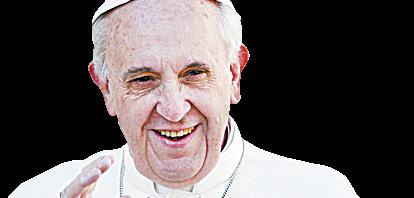
People were born to help communities thrive, not to kill others, Pope Francis said.
“Please let’s pray for peace, let’s do penance for peace,” he said during his general audience Feb. 12, launching an appeal for Catholics to ask for a peaceful resolution to the world’s conflicts.
Reflecting on the many countries at war, such as Ukraine, Palestine, Israel and Myanmar, the pope said, “Let’s pray for peace, let’s do our all for peace. Don’t forget that war is always a defeat.”
“We are not born to kill but to help people thrive. May we find paths of peace, please in your daily prayers, ask for peace,” he said.
The pope made his appeal for peace and read his prepared greetings, but his breathing sounded labored and congested. The pope had an aide, Monsignor Pierluigi Giroli, read his main talk.
In his prepared text, the pope focused on the birth of Jesus, the messianic king, in a humble stable.
“The Son of God is not born in a royal palace, but at the back of a house, in the space where the animals are kept,” the text said. “God does not come into the world with resounding proclamations; He does not manifest Himself with noise but begins His journey in humility.”
This is the humility of “a God who comes into history and does not dismantle the structures of the world but wants to illuminate them and recreate them from within,” the pope’s text said.
Then, the first witnesses are shepherds: “men of little culture, malodorous from constant contact with animals, they live on the margins of society,” he wrote.
“The place to meet the Messiah is a manger,” the text said.
The shepherds discover that the longawaited Messiah is born “for them, to be their savior, their shepherd. This news opens their hearts to wonder, praise and joyful proclamation,” he said.
Most people are too busy to see the most essential thing of all – the gift of salvation, the pope’s text said. “It is the humble and the poor who greet the event of the Incarnation.”
The pope said to ask for “the grace of being, like the shepherds, capable of wonder and praise before God, and capable of cherishing what He has entrusted to us: the talents, charisms, our vocation and the people He places beside us.”
“Let us ask the Lord to be able to discern in weakness the extraordinary strength of the child God, who comes to renew the world and transform our lives with His plan full of hope for all humanity,” he wrote in his text.
LANCE RICHEY OSV News
As the second married couple to be declared saints (along with Sts. Anne and Joachim, the parents of Mary), and the first to be canonized together, Sts. Louis and Zélie Martin offer a model of the vocation to love and holiness that is at the heart of the sacrament of marriage.
By showing how God worked through both their successes and failures as spouses and parents (including of St. Thérèse of Lisieux), the Martins can offer inspiration and hope for Catholic couples seeking to live out their faith in their everyday married life, which we celebrate Feb. 7-14 with National Marriage Week.
OPPOSITES ATTRACT

Zélie Guérin was a formidable young woman. Alongside her faith, the defining feature of Zélie’s personality was her determination to acquire financial independence. Her childhood had been an unhappy one, marked by material hardship. After she was denied entry to the convent, she turned to the art of lacemaking to acquire the respectable dowry which her parents’ poverty had denied her. These early experiences scarred Zélie, leading her to become what would today be called a workaholic.
Louis Martin could never be described that way. The youngest son of a military officer, he lived a prosperous but almost monastic existence as a watchmaker in Alençon after failing in his youthful attempt at a religious vocation (he did not know Latin). Hardworking and introverted, Louis divided his energies between his successful business and an intense religious devotion. Unlike many other businesses, his shop always remained closed on Sunday. Still single in his 30s, it was rumored he had taken a vow of celibacy.
Louis’ mother, concerned about her youngest son’s extended bachelorhood, met Zélie at a class on lacemaking and
FEB. 16-22
Sunday: Jer 17:5-8, Ps 1:1-2, 3, 4, 6, 1 Cor 15:12, 16-20, Lk 6:17, 20-26; Monday: Gen 4:1-15, 25, Ps 50:1,8, 16bc-17, 20-21, Mk 8:11-13; Tuesday: Gen 6:5-8; 7:1-5, 10, Ps 29:1a, 2, 3ac-4, 3b & 9c-10, Mk 8:14-21; Wednesday: Gen 8:6-13, 20-22, Ps 116:12-13, 14-15, 18-19, Mk 8:22-26; Thursday: Gen 9:1-13, Ps 102:1618, 19-21, 29 and 22-23, Mk 8:27-33; Friday: Gen 11:1-9, Ps 33:10-11, 12-13, 14-15, Mk 8:349:1; Saturday (Chair of St. Peter, Apostle): 1 Pt 5:1-4, Ps 23:1-3a, 4, 5, 6, Mt 16:13-19
immediately saw a potential match for her son. How this connection led to the young couple’s initial meeting on a bridge in town is unknown. Told by an inner voice that the handsome stranger she encountered was to be her future husband, the everenergetic Zélie wasted no time fulfilling this prophecy. Their marriage followed within three months, in July 1858.
A GROWING BUT IMPERFECT FAMILY
Louis initially offered Zélie a “Josephite” (celibate) marriage. Zélie’s somewhat reluctant acceptance of the offer made her a natural match for this quiet man. However, their spiritual adviser quickly put an end to this arrangement, and Zélie eventually gave birth to nine children, five of whom survived into adulthood.
Zélie’s personality made it difficult for her to express the love she had for her children. Unintentionally, Zélie inflicted the emotional neglect she had suffered upon her own daughter, Marie-Léonie. The struggles that Léonie had should put to rest any illusions that either the Martin
FEB. 23-MARCH 1
Sunday: 1 Sam 26:2, 7-9, 12-13, 22-23, Ps
103:1-2, 3-4, 8, 10, 12-13, 1 Cor 15:45-49, Lk
6:27-38; Monday: Sir 1:1-10, Ps 93:1ab, 1cd-2, 5, Mk 9:14-29; Tuesday: Sir 2:1-11, Ps 37:3-4, 18-19, 27-28, 39-40, Mk 9:30-37; Wednesday: Sir 4:11-19, Ps 119:165, 168, 171, 172, 174, 175, Mk 9:38-40; Thursday: Sir 5:1-8, Ps 1:1-4, 6, Mk 9:41-50; Friday: Sir 6:5-17, Ps 119:12, 16, 18, 27, 34, 35, Mk 10:1-12; Saturday: Sir 17:115, Ps 103:13-14, 15-16, 17-18, Mk 10:13-16
marriage or their parenting was perfect.
The love between Louis and Zélie, and the faith upon which it rested, was put to its greatest trial by the cancer from which she would die in 1877. Several years earlier, Zélie had seen the first symptoms of illness. She ignored her condition while the tumor metastasized and spread. By the time she sought help in late 1876, her condition was beyond treatment.
Confronted with her terminal diagnosis on the eve of her 45th birthday, with five children and a husband in need of her care, Louis and Zélie fell back upon their faith. At her deathbed, both spouses revealed the deep love and faith upon which they had built their lives. Their daughter, Celine, recalled: “We were all kneeling beside her bed, in order of age, with Thérèse beside me. Our poor dear father could not restrain his grief. As for our mother, she remained calm and self-possessed. She was to die in a truly saintly way, giving us, to the very end, the example of complete self-forgetfulness and most lively faith.”
A MODEL FOR OTHERS
The scene, combining tragedy and sorrow with the comfort and security of a profound faith in God, serves as a miniature of their married life.
Already shattered by her death, Louis gradually retreated from the world, retiring from business to care for his family. In 1886, Louis had his first episode of dementia, wandering alone for four days.
The last fragment of his writing we possess was a letter to his daughters from 1888. He writes: “I want to tell you, my dear children, that I have the urgent desire to thank God and to make you thank God, because I feel that our family, though very humble, has the honor of being among the privileged of our adorable Creator.”
As the first married couple to be made saints simultaneously, Louis and Zélie Martin are a model for couples seeking to live out their faith amid the pressures of work, children, illness and loss.
MARCH 2-8
Sunday: Sir 27:4-7, Ps 92:2-3, 13-14, 15-16, 1 Cor 15:54-58, Lk 6:39-45; Monday: Sir 17:20-24, Ps 32:1-2, 5, 6, 7, Mk 10:17-27; Tuesday: Sir 35:1-12, Ps 50:5-6, 7-8, 14, 23, Mk 10:28-31; Wednesday (Ash Wednesday): Joel 2:12-18, Ps 51:3-4, 5-6ab, 12-13, 14 and 17, 2 Cor 5:20-6:2, Mt 6:1-6, 16-18; Thursday: Deut 30:15-20, Ps 1:1-2, 3, 4 and 6, Lk 9:2225; Friday: Is 58:1-9a, Ps 51:3-4, 5-6ab, 18-19, Mt 9:14-15; Saturday: Is 58:9b-14, Ps 86:1-2, 3-4, 5-6, Lk 5:27-32
is ‘a moral concern’
CHARLOTTE — In a joint statement Feb. 5, North Carolina’s two Catholic bishops urged their 1 million followers to reflect on Church teaching about immigration – emphasizing the moral imperative of protecting immigrants’ human rights while respecting laws and borders. They also reiterated the U.S. bishops’ long-standing call for reform of the nation’s immigration system.

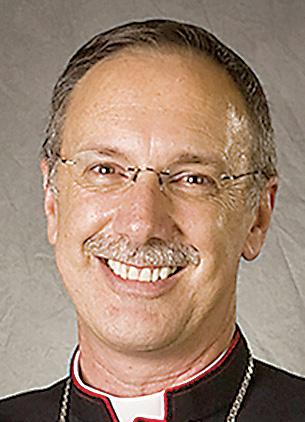
“The issue of immigration policy and enforcement is both complicated and emotional,” said the bishops of North Carolina’s two dioceses –Bishop Michael Martin of Charlotte and Bishop Luis Zarama of Raleigh – in their first joint statement since Martin was ordained last May.
“While we agree that there is room for disagreement and discussion with respect to immigration policy,” the bishops encouraged people to engage in “personal reflection and formation on these issues.”
“As members of the human family, each individual deserves and must be granted the dignity that not only supports and fosters the common good of our society,” they said, “but also reflects the reality that we are all fundamentally brothers and sisters in the Lord.”
They emphasized the need for immigration reform based on principles of Catholic social teaching:
n People have the right to migrate to sustain their lives and the lives of their families.
n A country has the right to regulate its borders and to control immigration.
n A country must regulate its borders with justice and mercy.
n Humanitarian protections for vulnerable families should be a priority.
— Catholic News Herald
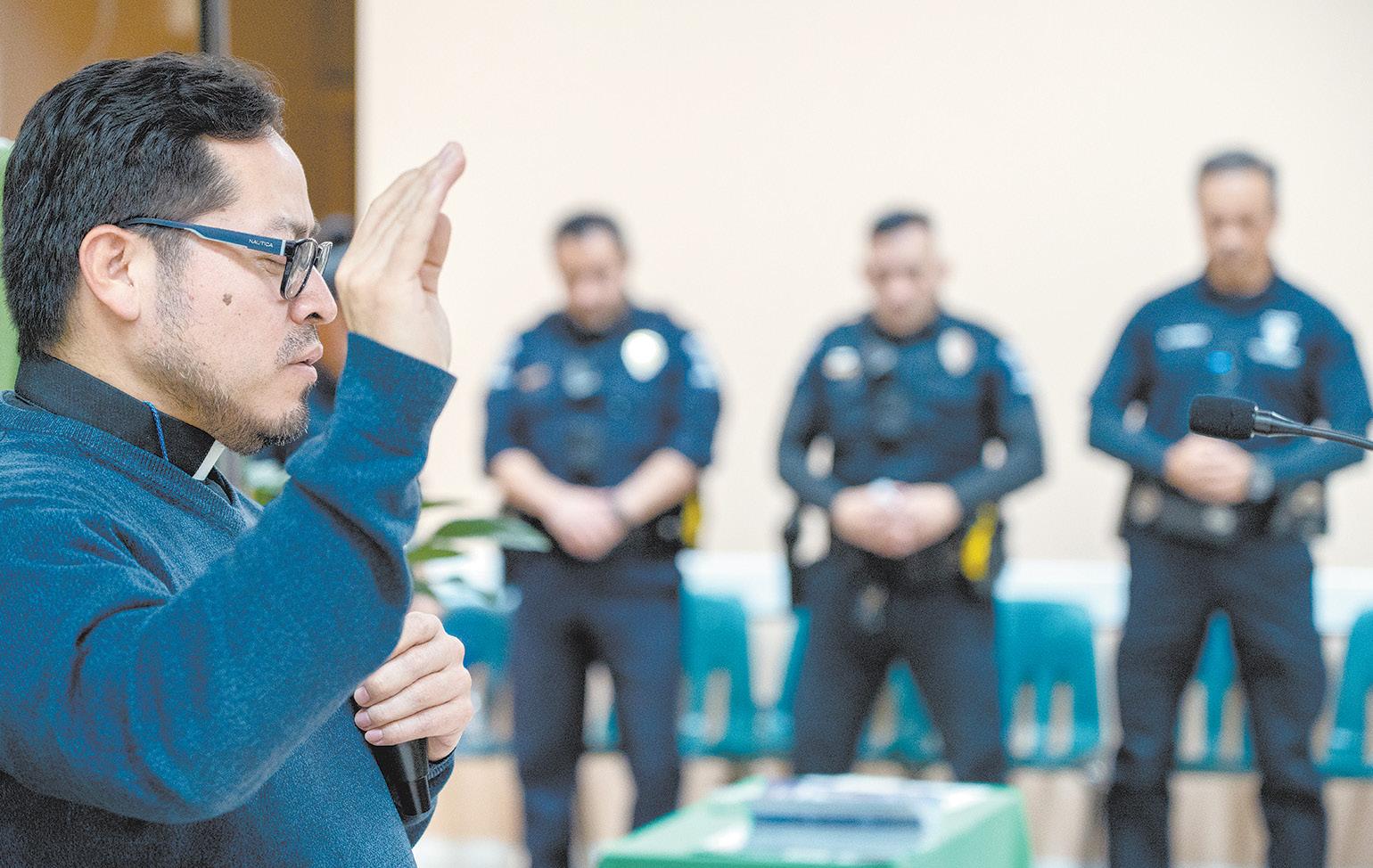
‘Do not be afraid’
From pastors to pope, Church urges compassion for immigrants
LIZ CHANDLER lchandler@rcdoc.org
CHARLOTTE — Church and lay leaders across the Diocese of Charlotte are providing spiritual support and practical guidance for immigrants worried about getting swept up by immigration enforcement actions promised by President Donald Trump.
Raids by U.S. Immigration and Customs Enforcement (ICE) have not materialized locally so far, and most pastors report little change in Mass attendance. Yet more than a dozen priests, Catholic Charities and Hispanic Ministry workers interviewed say immigrants and their families are living in fear, avoiding nonessential travel, and taking steps to protect themselves – from researching their rights, to seeking documented status, to diverting their spending toward car repairs so they won’t entice police to stop them for equipment issues.
Around the country, some immigrants are skipping work or school when ICE activity seems close, according to media reports. Locally, even immigrants who are naturalized citizens are carrying their official documents everywhere. Priests in the Charlotte and Greensboro areas are counseling parents who are struggling to explain to their children the potential threat without traumatizing them.
“Many people are afraid – especially children who wonder what would happen if ICE takes their mom or dad, or both together,” says Deacon Enedino Aquino, the diocese’s Hispanic Ministry coordinator in Greensboro.
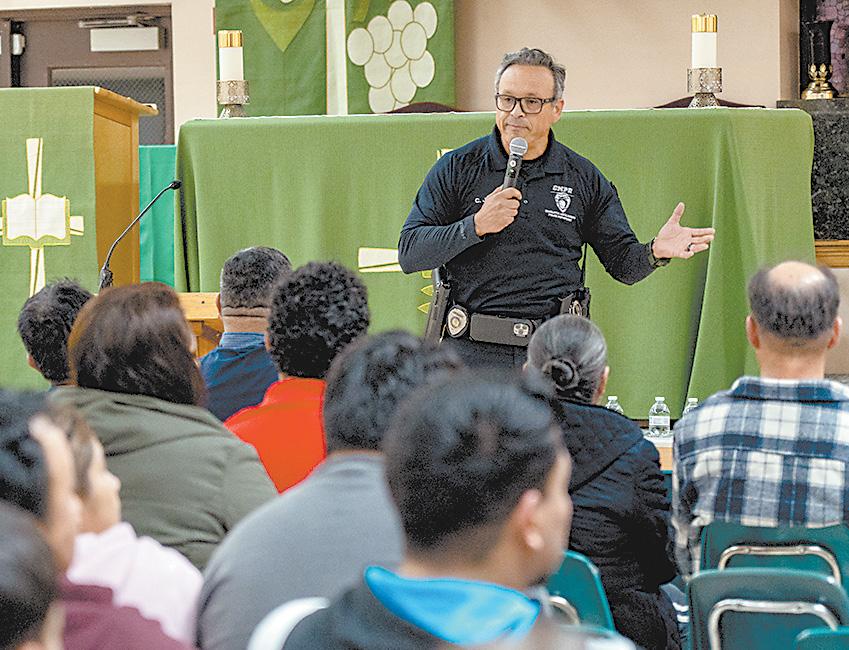
schools and hospitals.
Still, immigrants are turning to the Church for support. And she is responding.
In Charlotte, one predominantly Hispanic parish recently hosted CharlotteMecklenburg Police officers for a conversation with 200 immigrants. Other parishes are presenting “Know Your Rights” seminars. Rumors are rampant, falsely warning of pending raids and recounting tales of crimes against immigrants. The priest at one mountain parish called sheriffs’ departments in several counties to inquire about their policies. Another pledged to “defend” the families in his parish “to the last consequences.”
“We are here to help you, not to harm you,” CMPD Officer Verónica Cruz told the 200 immigrants who turned out Feb. 6 at Our Lady of Guadalupe Church to learn more about local policing.
Vincentian Father Marvin Navas introduced the five police officers at the event as “friends” of the community and urged the crowd to pray for them because their daily duties pose danger.
“I came with fear, and I leave more at ease,” said Dilman, a parishioner from Guatemala who gave his first nameonly, after the presentation.
“I’m satisfied with the answers they gave us,” said Juan Esteban Tirado, also in attendance. “Now, as they say, without fear or worry, I’ll take this information to my friends and family.”
‘WELCOMING THE STRANGER’
Across the country, the Church is challenging policy and providing practical advice for immigrants.
From coast to coast, Catholic bishops have been speaking out against mass deportation and the targeting of sensitive areas for immigration crackdowns.
“We stand with you,” Charlotte Bishop Michael Martin said in a message to immigrants days before the inauguration. “Do not be afraid.”
Read online
At www.catholicnewsherald.com : Read the full statement from Bishop Michael Martin and Bishop Luis Zarama
Among other measures aimed at immigrants, the Trump administration rescinded a long-standing policy that restricted immigration enforcement in “sensitive locations” such as churches,
She said an alarming percentage of robberies are committed against Hispanics and that Charlotte has seen a noticeable decline in crime reporting, since many Hispanics worry their immigration status could be questioned if they call police.
In a separate message Feb. 5, Bishop Martin and Raleigh Bishop Luis Zarama published a joint statement, saying: “Our Catholic Charities offices stand ready to help with food and other household necessities for all families. As Catholics, we advocate for the recognition that immigrants, as members of God’s human family, are deserving of and must be granted the appropriate dignity as our brothers and sisters in the Lord. Jesus Himself was a refugee and taught us to welcome the stranger and to realize that in welcoming the stranger, we are welcoming Christ Himself.”
IMMIGRANTS, SEE PAGE 13
CHRISTINA LEE KNAUSS clknauss@rcdoc.org
BELMONT — Caring for the Earth and for God’s creation is an important part of being a Catholic, one reflected in writings of Pope Benedict XVI and in Pope Francis’s 2015 encyclical “Laudato Si.”
A capacity crowd of 150 people from 40 parishes across the Diocese of Charlotte reflected on this and discussed ways to care for the Earth and people in need on Feb. 8 at “Walking with the Spirit in the World,” a conference sponsored by the Sisters of Mercy and Catholic Charities Diocese of Charlotte. The event was held on the Sisters of Mercy campus in Belmont and featured keynote talks by Bishop Michael Martin and Catherine Wright. Wright, a Christian eco-theologian at Wingate University who focuses on science, Catholicism, spirituality and ethics, is the author of “Creation, God and Humanity” and “Caring for Our Common Home.”
Wright talked about the lives of Sts. Francis and Clare of Assisi and how their spiritual legacy – as well as the lives of other prominent Franciscans throughout history – reflected a concern for both the natural world and the needs of the poor and suffering. She also described how Jesuits founder St. Ignatius of Loyola believed in “finding God in all things,” and how this approach can help people cultivate a respect for all of God’s creation – and, consequently, want to preserve it. In his address to the group, Bishop Michael Martin reflected on the call of
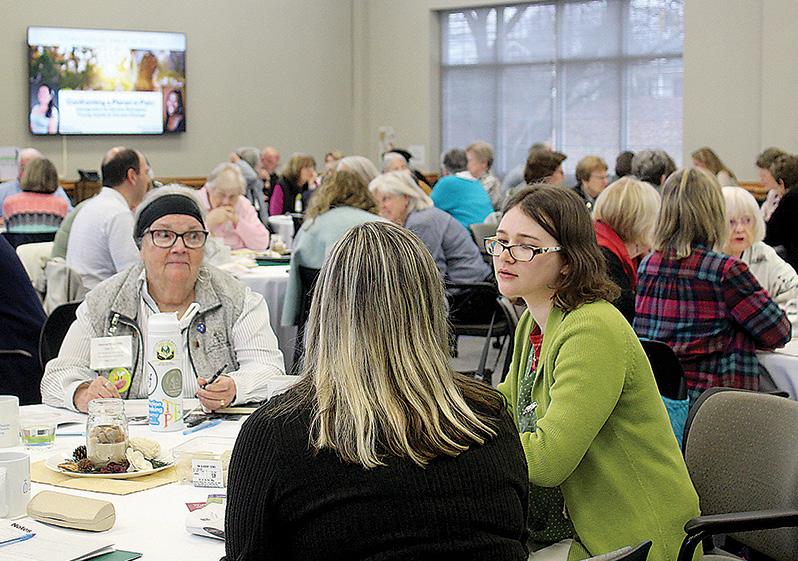
“Laudato Si” for all people to recognize God’s work in their fellow humans and in the natural world.
Bishop Martin said one of today’s major problems is the tendency for people to live in what he called a “transactional model” with others. Transactional relationships are based on a “what can you do for me?”
attitude instead of respect and care for others, Bishop Martin said.
“We’re trying to manage our resources and can’t find ways to love each other,” he said.
That transactional side of our culture, he said, has also led too many people to dismiss their inherent dignity as children
of God, which in turn has driven them away from a concern for others and for creation.
“You can’t love if you don’t know love, and you can’t treat others with dignity if you don’t recognize your own,” he said.
A panel featured three speakers discussing issues affecting the environment and North Carolina residents:
Larry Baldwin of Waterkeeper Alliance spoke about the polluting practices of large factory farms, particularly in eastern North Carolina. He serves as the Pure Farms, Pure Waters coordinator for the alliance. Baldwin talked about the amount of pollution both hog and poultry farms produce, suggested attendees learn about the sources of the food they eat, and offered advice on how to reach out to legislators to encourage more sustainable, clean ways to handle waste from such farms.
Mara Fenn and Erica Grace Lubamba, who work with Catholic Charities Diocese of Charlotte, discussed how climate change and other factors are destroying natural environments, affecting the poor worldwide and causing some to be displaced from their home countries. Fenn is a refugee employment case worker with Catholic Charities, and Lubamba is a refugee employment specialist. Both help legal refugees who are resettled in the diocese find employment.
The event also allowed attendees to discuss strategies for promoting care for the environment at the individual and parish level and beyond.
CÉSAR HURTADO rchurtado@rcdoc.org
CHARLOTTE — In a day filled with fellowship, friendship, companionship and prayer, more than 250 men attended the 15th annual Men’s Conference of the Carolinas Feb. 8 at St. Thomas Aquinas Church. The conference’s theme, “Who Do You Serve?” reflected its purpose of uniting body, soul and mind into a cohesive whole in the daily life of Catholic men.
In his welcoming remarks, Bishop Michael Martin invited men to come together to take an active role in building the Kingdom of God in this world.
“I am very happy to see so many men coming to strengthen their faith in the company of others,” Bishop Martin said. “God has given us what we need to be creators with Him. We are co-creators with Him. Imagine that power! Are we ready to build this new heaven with Him?” he asked. Bishop Martin warmly greeted Bishop Jacques Eric Fabre-Jeune of the Diocese of Charleston, South Carolina, who celebrated Mass for the attendees, and they shared a few moments that got the crowd laughing. Bishop Fabre-Jeune focused most of his homily message on young men, who, he said, need all our attention. He invited two young people, who carried an image of Our Lady of Guadalupe in the entrance
procession for Mass, to accompany him and asked them questions during his homily.
Noting ministry assignments that took him to many countries over his years of priestly ministry, the bishop emphasized the universality of the Catholic Church. When someone judges you for being different, he said, don’t respond the same way, don’t judge them.
“What are you going to say?” he asked. “Don’t use your own words! Use the words of Scripture: Say that you love God above all things and love your neighbor as yourself.”
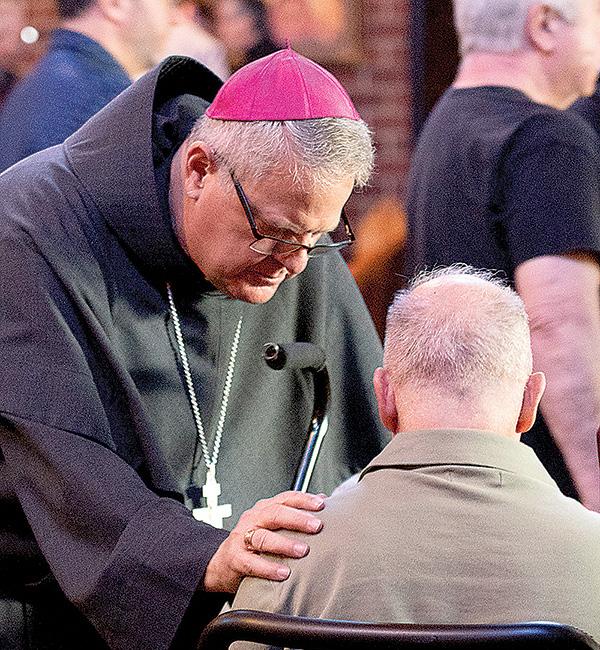
After the conference opened with welcoming words and prayer, John Frankman, a military captain and activist who converted to the Catholic faith, took the stage. Frankman holds a master’s degree in systematic theology, a discipline of Christian theology that provides an ordered, rational and coherent explanation of the doctrines of the Christian faith.
He was followed by John Edwards, who shared his personal testimony of conversion to the Catholic faith in 2013. Edwards, originally from Alabama, served in the U.S. Navy and as a police officer in Birmingham. He and his wife Coni created a non-denominational church serving over 500 people before his conversion.
After lunch, E-Knock, a Catholic speaker and rapper, performed. Fawaz Yasi (the
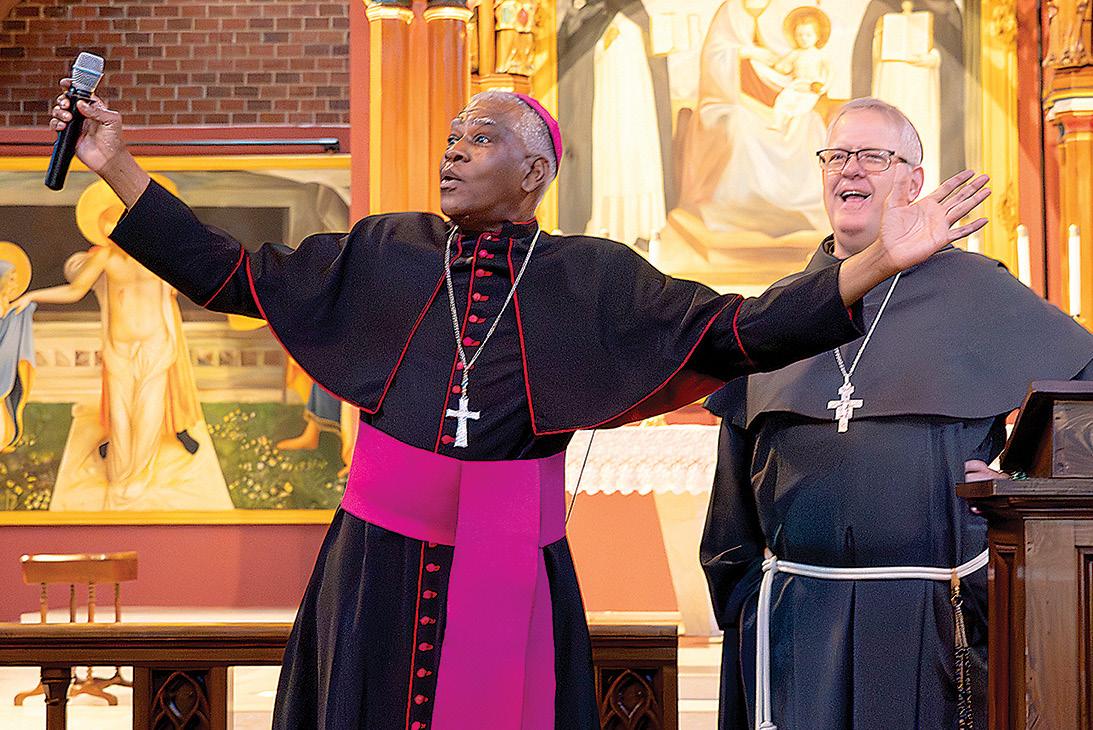
artist’s real name) is a Syrian Christian from northern Iraq who emigrated to the United States with his family at the age of 5. Passionate about family farming, the Church, youth ministry and rap music, he released his latest album, “Book of E-Knock,” on iTunes under the Top Christian and Gospel category.
The one-day conference also offered Eucharistic Adoration, the rosary, and a
blessing in the afternoon.
Attendee Freddy García, a member of the Knights of Columbus in Hickory, was thankful for the inspiration and motivation he received during the conference. “Bishop Martin’s message impacted me,” García said. “I had never before thought that God had placed me in this world to work in His vineyard as a man, and to be a co-creator of life with Him.”
LISA GERACI lmgeraci@rcdoc.org
HOT SPRINGS — Gloria Sundquist wasn’t always a “mountain woman,” but after taking a camping trip to Hot Springs in 1995, she never left. Weathering Tropical Storm Helene with help from St. Andrew the Apostle Parish and other faith-based organizations has given her a new title: “survivor.”
When Sundquist woke up the morning of Sept. 27, her home had no electricity, no phone service and no internet. The nearby French Broad River was swollen, water starting to spill over the banks. It was only 8 a.m. As the sun rose, so did the water. By 9 a.m., Sundquist thought the river should have crested, but it showed no sign of letting up. At 10 a.m. she looked at the river’s edge from her back porch, the water still rising.
“I quickly realized this was far worse than the flood in 2004 from Hurricane Ivan,” she later recounted.
A HARROWING MORNING
Help for Helene victims

From then until noon, the river raged, swallowing Sundquist’s land minute by minute, inch by inch. Her home and a small piece of land under it turned into an island surrounded by the raging French Broad River. She started praying – she couldn’t leave, but she couldn’t stay, so she just watched with her pets at her side while her sanctuary was washing away around her.
At www.ccdoc.org : Were you affected by Tropical Storm Helene?
Connect to resources and aid through Catholic Charities Diocese of Charlotte
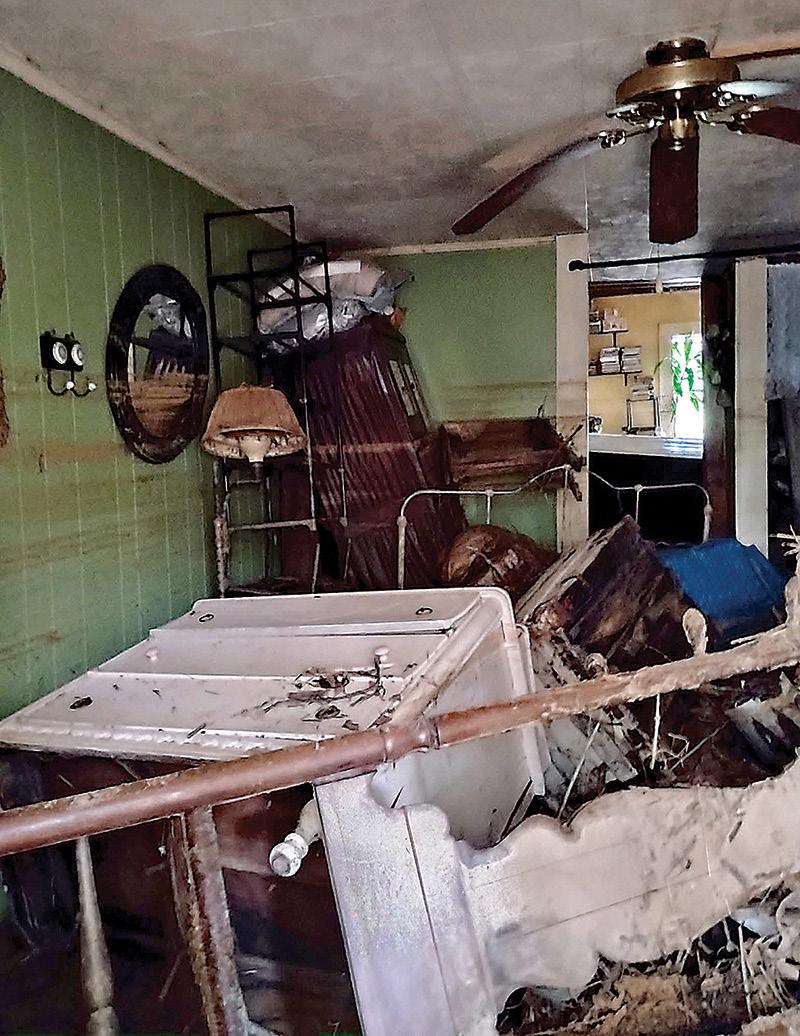
“It sounded like a pipe had broken underneath the house, but it was the river,” she said. She could feel the water coursing under the floorboards.
She watched the water rise over the back porch steps, then break through the bottom of the sliding glass doors and creep across the floor.
Every minute felt like another foot of water. Soon enough, her cats, disliking the wetness beneath their paws, started jumping on windowsills, counters and chairs to escape.
Sundquist pulled down her attic ladder, ran after the cats, and tossed each up to higher ground. As one would jump up, another would jump down, but finally she was
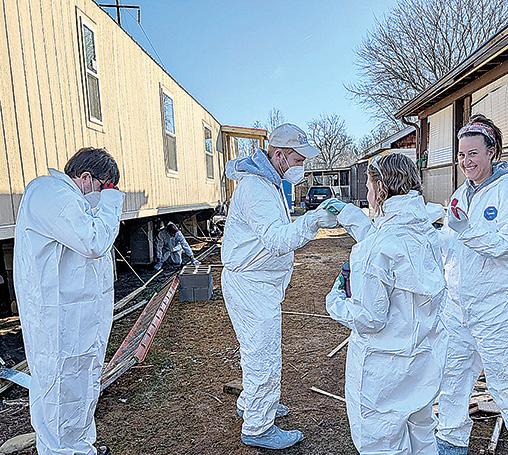

able to capture all six. By this time, the water was up to her waist and her windows looked more like portholes. She watched her coffee table float, then her favorite lamp, the couch, and eventually the refrigerator.
Sundquist could wade through the water, but her dog Marble could only do his little dog paddle. Water started
SWANNANOA — Catholic Charities Diocese of Charlotte had its first agency-wide Helene Disaster Day of Service Feb. 3, helping rebuild local homes impacted by the tropical storm. From debris removal to installing insulation funded by generous donors, 18 dedicated Catholic Charities staff members were on hand to help bring renewal and hope to a community in need of both. During these relief efforts and many others throughout the year, volunteers have been a lifeline.
Being a Catholic Charities volunteer has enabled her to be a channel of God’s love and mercy for people in need, said Donna Bange, a Catholic Charities advisory board member at its Western Region Office. “Catholic Charities DOC is blessed with incredibly generous donors and the parish contributions via the Annual Appeal,” Bange said. “Additionally, there has been an overwhelming outpouring of donations to support the Helene Hurricane relief effort.”
Volunteers are the bridge from these donations to the individuals seeking assistance, she said, because they are there locally, turning those donations into basic necessities at food pantries and being the helping hands that rebuild lives.
seeping through the home’s old screenless windows. Hope was fleeting. She knew there was no way she could get 100-pound Marble into the attic while trying to stay balanced herself.
When she felt like she had no strength or options left, she heard a male voice calling outside her window.
“Gloria, Gloria, are you in there? Come here!”
Through the window she saw a raft containing four men she knew: Hot Springs Rafting Company owner Rodney McCall, her electrician Chris Pelletier, and friends Chad Ault and Chris Lafond.
Their raft approached one of her home’s windows, and Sundquist was able to climb aboard with their assistance.
Pelletier grabbed Marble, and they paddled out against the roiling floodwaters, towed by another boat with a gas motor. When they finally reached dry land, Sundquist was greeted with hugs, a blanket and dry clothes.
Sundquist said later, “I knew this thing was bigger than me. I had peace. I can’t explain it; when I couldn’t do any more than what I did, those men showed up in time.”
Sundquist’s century-old house had survived the 1916 flood and had good bones, but after Helene, the bones were all that was left. The water had risen to about seven feet. The floors of the house looked like a wavy ocean, the mud was thick, and nothing was salvageable.
Those first few days in the storm’s wake, volunteers and friends found their way to Sundquist’s home.
They brought hot food in styrofoam boxes, gave her a new camper to live in, and a 2002 Toyota Corolla to drive.
Her six-acre plot was a pile of sand with uprooted trees and debris blocking the view of the now-placid river.
Volunteers from Samaritan’s Purse, Assistant Pastor
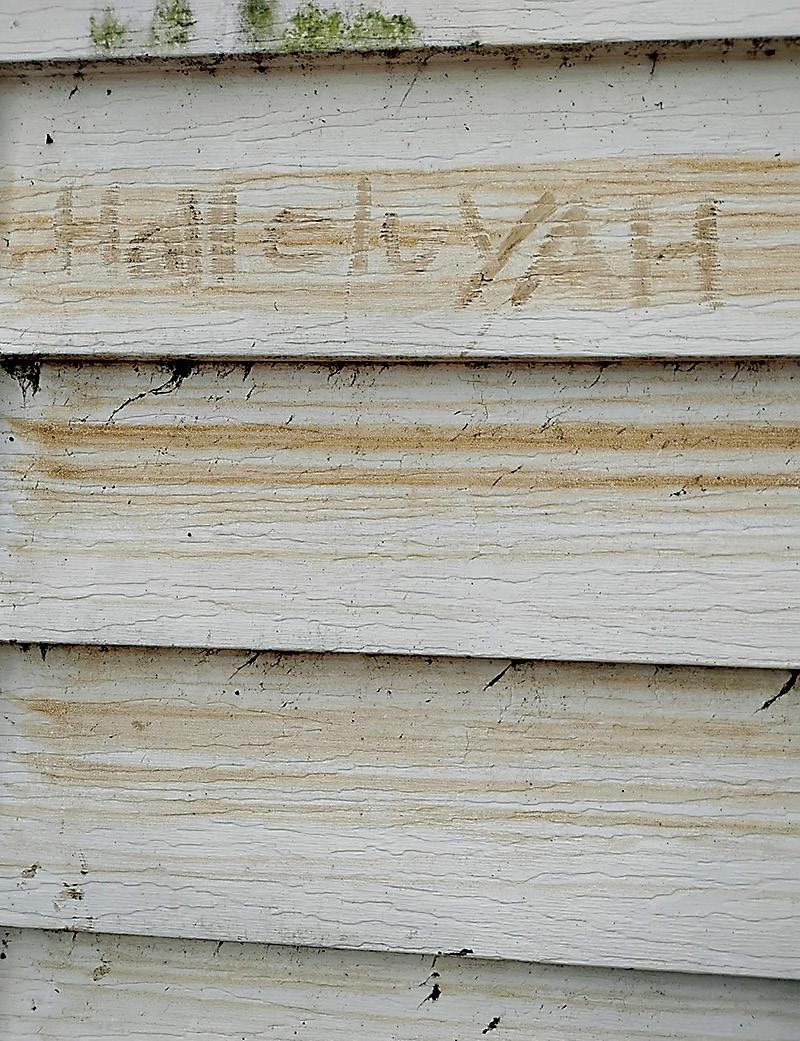
David Cisneros of Calvary Chapel Baptist Church, and a family of seven from Wisconsin worked tirelessly to help – shoveling mud, demolishing water-logged walls, and burning piles of debris. They sang hymns as they worked, and one of the daughters wrote “Halleluyah” in mud on the side of the house.
When all the mud was cleared, Sundquist started to feel helpless and overwhelmed. People told her to sell and get a mobile home.
“If you had seen this place gutted, there was no hope, SURVIVOR, SEE PAGE 7
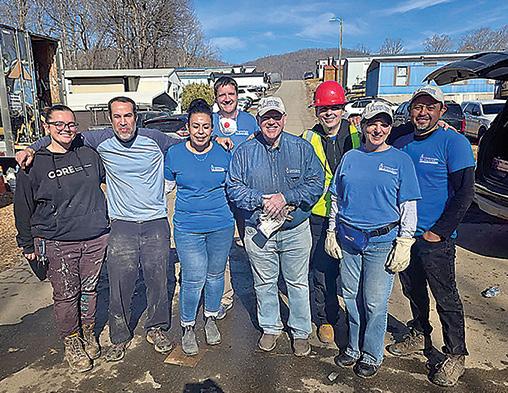
and that’s what everybody was trying to say – there’s no hope,” Sundquist recalled. “But I thought God wanted me to rebuild. This is my home.”
ST. ANDREW PARISHIONERS JUMP IN
Meanwhile in Marshall, St. Andrew parishioner Irma Fiordalisi and her husband Glenn received word from a Mennonite friend from Lock Haven Mennonite Church in Pennsylvania that they wanted to bring a work crew to help rebuild in the area. Fiordalisi had the perfect candidate in mind: her longtime friend Sundquist.
“Right then, me of little faith had someone with so much faith show up,” Sundquist said.
With the help of the Mennonites and the guidance of her steadfast volunteer “angel” Jason Maldaner, CEO of Farm & Home Pro, plus countless others, rebuilding became a possibility. The only thing missing was money to pay for it all.
ST. ANDREW DONATES $20,000
Kelly Hansen was St. Andrew’s parish secretary before the storm. After Oct. 3, she also became relief center coordinator, volunteer recruiter, grief counselor, grant writer and hope giver. While other donation centers have since closed, Hansen and her team of eight volunteers remain open 10 a.m. to 6 p.m. daily, except Sundays.
Hansen sees anywhere from 10 to 20 families a day. Some need tents, some need propane for heat, and some just need a listening ear.
“When you go through something traumatic like that, you need to tell it over and over,” Hansen explained.
Between handing out diapers and Catholic Charities gift cards to WalMart, Hansen created a grant application for flood victims awarding up to $50,000 in building supplies.
“When I put the word out there, we immediately in the
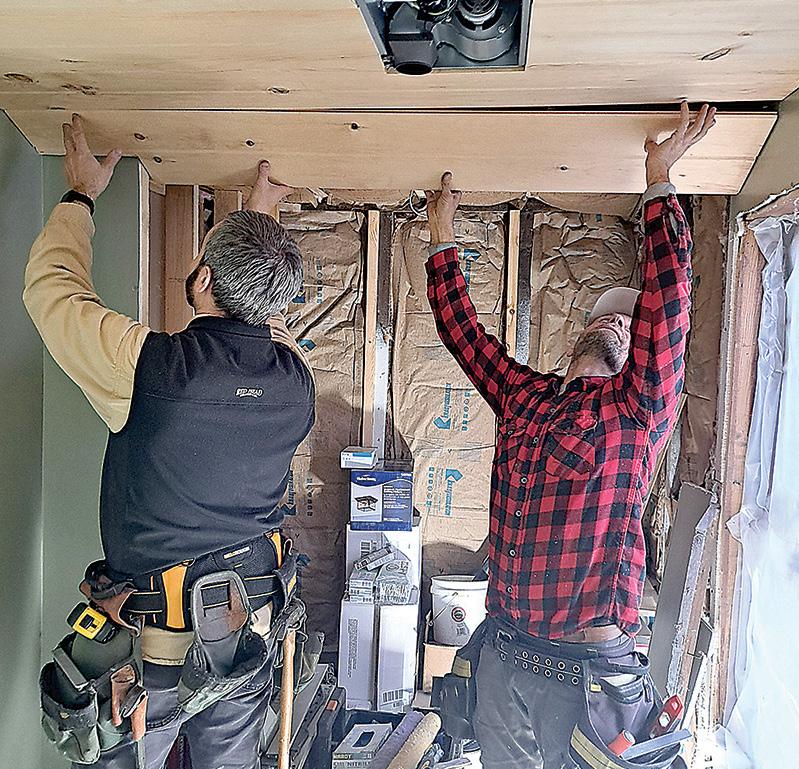
PHOTO PROVIDED
Mennonites Dervin Shelley and Darren Seibel install the new ceiling in Gloria Sundquist’s home. The Mennonites began construction work in mid-January, then returned Feb. 9 to install floors, hang doors, put in cabinets, add trim and paint.
parish community heard about Gloria … everyone was grateful to hear that St. Andrew might be helping her,” Hansen said.
Fiordalisi had never filled out a grant application before, but with the help of contractor Jason Maldaner they created a $20,000 material list to repair Sundquist’s home.
“Everything fell into place – Irma had volunteers (the Mennonites), and we had the grant so we could pay for the materials so the volunteers could get to work,” Hansen said.

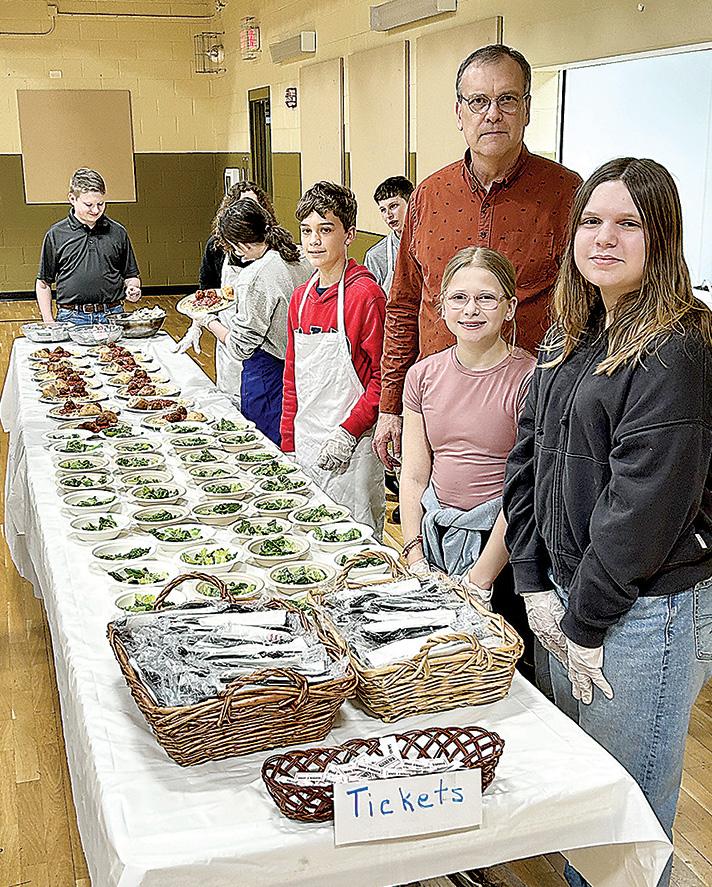
DENVER — About 400 people attended a “Helene Helper” spaghetti dinner offered Feb. 8 by members of Holy Spirit Church in Denver. Volunteers from the parish cooked up hundreds of dine-in and to-go spaghetti dinners available for a donation to the parish’s ongoing relief efforts in western North Carolina, particularly in Ashe County. Donations will go to purchase building supplies and other needs for the region, which are transported to Ashe County nearly every week by members of Knights of Columbus Council 10389, who have been helping Helene survivors since the week after the storm.
Leftover food also went to help others. About 60 to-go plates of spaghetti, as well as desserts and bread, were taken to homeless men and women at Samaritan Ministries in West Jefferson by a volunteer from St. Francis of Assisi Church in Jefferson, also in Ashe County.
The crew of six Mennonites drove their big trucks towing trailers full of equipment from Lock Haven to Hot Springs in mid-January, during the coldest weeks of winter. They stayed for a week at St. Andrew parishioners Ben and Terri Geraci’s home with a mission to serve.
“I wanted to do something to help the people who were hurt by the flood,” said Terri Geraci. “This was perfect because Gloria is one of my best friends in the community.”
While the Mennonites toiled in the snow, installing subflooring, wiring and framing the walls, Fiordalisi, her husband and friends brought sandwiches to the site, warm meals after long days, and stocked the pantry with snacks.
“The fact that so many people worked together so well, I just think it was special,” Fiordalisi said. “We were focused on getting Gloria the hope that she needed, and it was fulfilling to do so.”
The Mennonite community arrived back at the Geraci home Feb. 9 to continue construction. The focus this time was painting, hanging doors and trim. The Mennonite community, along with Maldaner and Pastor Cisneros, have pledged to keep working until Sundquist walks into her fully remodeled home.
Hansen hopes to one day visit all the people she is helping and see Sundquist’s completed house.
“I wouldn’t elect to have all this disaster happen again, but I wouldn’t trade the experience. We are proud of what we are doing up here. We have helped so many people. It is beautiful – there are no faith boundaries, we are all God’s children, and it doesn’t matter what church we go to when it comes to helping one another because the scripture says the same thing to all of us: ‘Love your neighbor.’”
What does Sundquist say? “This is the house that God has built. He has rebuilt this home with His people, and it is going to be so beautiful.”
EDITOR’S NOTE: Ben and Terri Geraci are the father and step-mother of reporter Lisa Geraci.
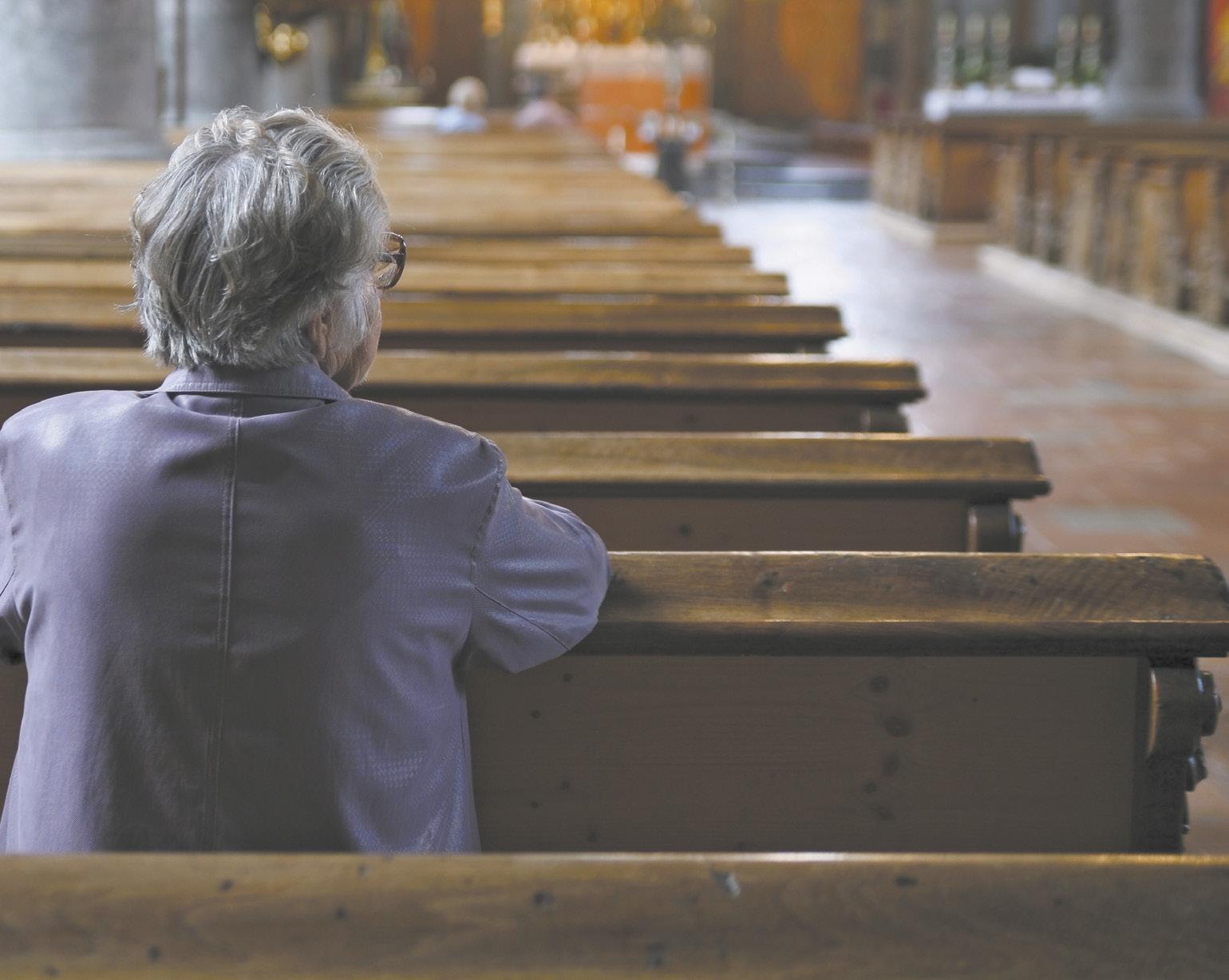
Your parish, Catholic school, Catholic ministry, the Diocese of Charlotte, or the diocesan foundation are qualified charities eligible to receive grants from Donor Advised Funds. Your DAF grant can be restricted for offertory, campaigns, programs, or the DSA.
Foundation of the Diocese of Charlotte
For more information contact: Gina Rhodes, gmrhodes@rcdoc.org or (704) 370-3364.
Priest retirement announced
CHARLOTTE — Bishop Michael T. Martin, OFM Conv., announces the retirement of Father George D. Byers, pastor of Holy Redeemer Parish in Andrews and Prince of Peace Mission in Robbinsville, effective Feb. 11, 2025. Details of the assignment of a new pastor will be forthcoming.
— Catholic News Herald
CHARLOTTE — The upcoming 2025 Catholic Relief Services Rice Bowl program begins on Ash Wednesday, March 5.
This year marks the 50th anniversary of the CRS Rice Bowl program, which gives Catholics across the U.S. the opportunity to assist the global human family through daily prayer, weekly fasting and almsgiving. As Pope Francis noted: “We have to state, without mincing words, that there is an inseparable bond between our faith and the poor. May we never abandon them” (“Evangelii Gaudium,” 48). Parishes and schools already in the program should receive materials in mid-February. To confirm an upcoming shipment or request additional materials, call CRS at 1-800-2220025. Those participating for the first time can call CRS or go to www.crsricebowl.org to order. Materials ordered by Tuesday, Feb. 18, should arrive before the program starts on Ash Wednesday.
This year, Deacon Daren Bitter, who serves as a deacon at St. Matthew Parish, has been selected as a CRS Global Fellow. Deacon Bitter recently traveled with other fellows to Guatemala to see the work of CRS firsthand. Interested in Deacon Daren Bitter speaking at your parish or ministry? Please contact him at dsbitter@rcdoc.com or 704-771-9888.
— Joe Purello
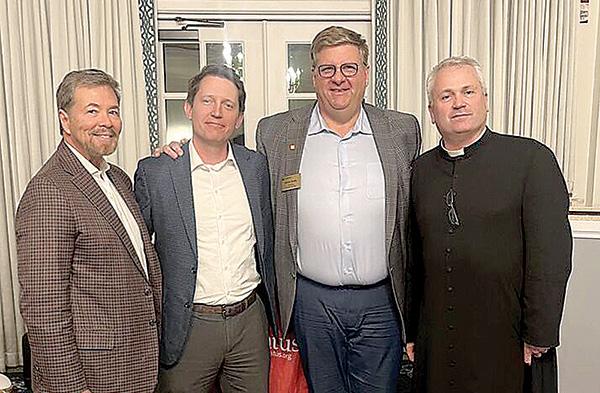
CHARLOTTE — The Charlotte chapter of Legatus recently elected new officers. Legatus is an international organization of Catholic business leaders and their spouses who strive to be “ambassadors for Christ in the marketplace.” Legatus members meet monthly in the Charlotte area to grow in their faith, network and share their experiences and insights as business leaders in their communities.
Kelly Scully, AIA, NCARB, was inducted as president, Joseph Hammond as vice president, and Mike Schulte as treasurer. Legatus was also honored to formally induct Chris Miorin and Sarah Miorin. Legatus thanked outgoing officers David Anderson and Cari Berger for their service.
To learn more about joining Legatus, please email charlotte@legatus.org.
— Catholic News Herald
LIZ CHANDLER AND CHRISTINA LEE KNAUSS catholicnews@rcdoc.org
MOUNT HOLLY — Construction of a new chapel that will accommodate more visitors at St. Joseph College Seminary is expected to begin this spring – bringing to fruition a long-planned “home of the Lord” with new financial features built into the $24 million project.
Working in collaboration with Bishop Michael Martin, seminary and diocesan leaders have adopted a plan that not only includes a new chapel with seating for 150 people, but also will pay off existing seminary construction debt and set aside funding for an endowment to pay for long-term capital needs.

“It’s great news to be moving forward with a chapel that will enhance the prayer lives of our seminarians and accommodate triple the number of visitors we can welcome in our chapel now,” said Father Matthew Kauth, seminary rector. “We made some changes in the project to layer in new financial components and to focus our building exclusively on the chapel – which really is the heart of the project.”
St. Joseph College Seminary opened in 2020 in Mount Holly and currently houses 21 men – with room for more – who are discerning a call to the priesthood in the Diocese of Charlotte while earning their undergraduate degree at nearby Belmont Abbey College.
Its current chapel seats about 50 and was originally designed as a lecture and dining hall.
The college seminary celebrated a groundbreaking for the chapel last May but soon put things on hold so the diocese’s new bishop could review the project and learn about the seminary program. Working together, seminary
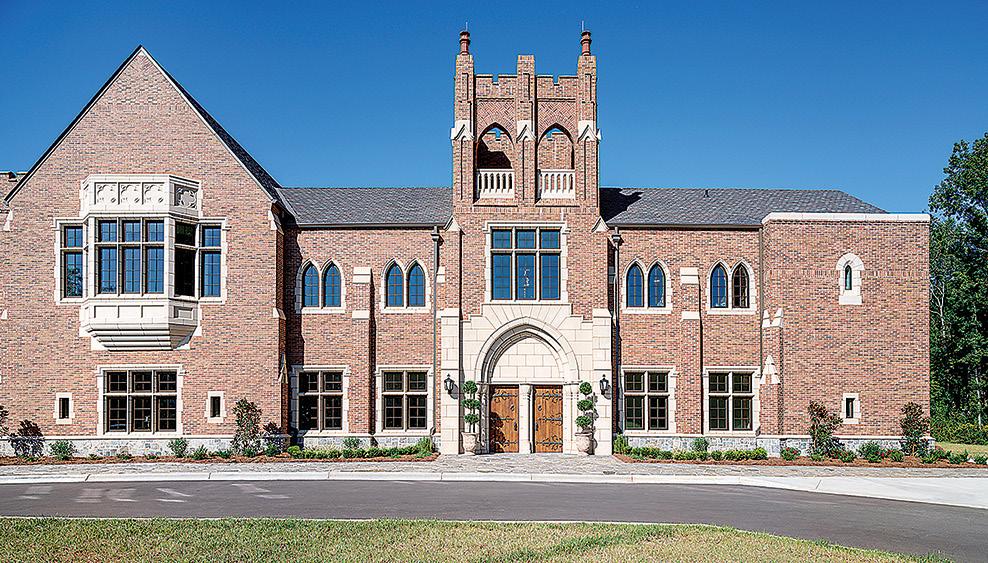
and diocesan leaders made changes to the project to layer in the financial components.
The project now includes $20.7 million for the chapel and related sitework and furnishings, $2 million for the endowment and $1.7 million for debt elimination. The funding comes from generous donors who gave to the seminary’s capital campaign.
“This project is a testament to the success of the diocese’s thriving vocations program,” said Emmett Sapp, director of construction and real estate for the diocese. “A stand-alone chapel was always envisioned to be part of the seminary campus, and the changes we made to eliminate debt and create an endowment will only enhance the long-term sustainability of the buildings.”
The college seminary helps train priests who will go out to the parishes and minister to the diocese’s growing
population. Entering its 10th year, the seminary has graduated eight men who have been ordained priests, with five more anticipated to graduate this year. They will go on to study at major seminaries in Ohio and Rome, then return to the diocese to serve as priests.
The new chapel will be an integral part of the seminarians’ formation process, Father Kauth said. He and diocesan leaders are now meeting with architects to finalize plans and will soon be seeking new building permits.
Construction is expected to take at least 18 months.
“The chapel on any campus is, of course, the home of the Lord,” said Father Kauth. “It’s a place for Catholics from around the diocese and beyond to come for renewal and reflection. We want the seminary to be a place that welcomes people and renews their hope.”
CHARLOTTE — The North Carolina Supreme Court has ruled the two-year “revival window” in the state’s 2019 SAFE Child Act is constitutional, making way for lawsuits filed by adults alleging they were sexually abused as children years ago to proceed through the courts.
Claims were filed during the law’s revival period in 2020 and 2021, accusing a range of defendants and their employers of abuse – including the Diocese of Charlotte and other churches, schools, the YMCA, Boy Scouts and a volunteer fire department, among others.
The diocese said in a statement it “seeks justice for all parties” involved, and now “will engage in the legal process and evaluate the evidence” in the historical cases against it. The claims against the diocese date back to the 1950s, “and in some cases no witnesses and little or no information is available,” the statement said.
The diocese says it has strict protections in place to ensure a safe environment in all of its churches, schools and facilities, and thousands of personnel and volunteers have completed its Safe Environment awareness program.
The key challenge to the SAFE Child Act’s revival window came in a case against the Gaston County Board of Education, which was sued years after an ex-high school wrestling coach was convicted of crimes against a team member.
The board’s attorneys argued the revival window ran afoul of the North Carolina constitution’s due process clause, which for more than 100 years had been interpreted by North Carolina’s Supreme Court to prevent revival of claims where the statute of limitations had already run out. They argued it would be difficult or impossible to defend these claims and see justice done given the passage of time, destroyed records, and the loss of other
evidence and witnesses.
Writing for the court, Chief Justice Paul Newby said that a constitutional provision barring “retrospective laws” applies only to retroactive criminal and certain tax laws – not civil claims for monetary compensation. “Our precedents confirm that the General Assembly may retroactively amend the statute of limitations for tort claims,” Newby wrote. In 2019, the diocese brought independent investigators in to review its personnel and other historical records to surface all credible claims of child sexual abuse against clergy in the history of the diocese. It published a list of those credibly accused on its accountability website, along with its Safe Environment policies, resources for parents, and a link to its independent Red Flag reporting hotline. The site is located at accountability.charlottediocese.org. — Catholic News Herald
CHRISTINA LEE KNAUSS clknauss@rcdoc.org
BELMONT — Students in the nursing program at Belmont Abbey College soon will be able to learn more about their chosen profession only minutes from campus.
On Jan. 8, CaroMont Regional Medical Center-Belmont opened its doors to patients on 28 acres adjacent to the college. It was the fulfilment of a process that began in 2020, when Gastoniabased CaroMont Health entered into an agreement with the college and the Benedictine monks at Belmont Abbey to lease land for a new state-of-the-art hospital and medical campus.
At a ribbon-cutting ceremony the day before, Benedictine Abbot Placid Solari and Belmont Abbey College’s President William Thierfelder joined CaroMont executives in celebrating the new facility. As the medical center increases its caseload in the coming months, Belmont Abbey nursing students will be able to begin their clinicals there.
The facility is part of Caromont Health’s commitment to invest more than $400 million in construction and expansion projects in and around Gaston County.
The five-story, 275,000-square-foot hospital has 54 licensed inpatient beds and 16 emergency department rooms. It features a labor and delivery unit, a surgical suite with two operating rooms, an OB/GYN suite and endoscopy/bronchoscopy suite, five waiting areas, a chapel and a cafeteria. It provides not only new health care opportunities for patients in Gaston County and surrounding areas, but also a range of opportunities for students in the college’s nursing program, which offers both bachelor’s and master’s degrees.
“Having CaroMont’s medical center actually on our property is very, very exciting and offers many advantages for our nursing

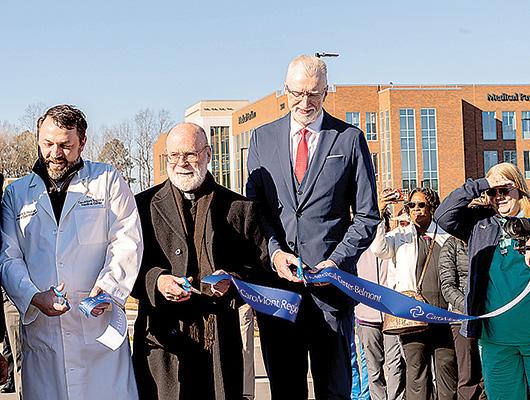
program,” said Dr. Lee-Ann Kenny, chair and director of the program. “CaroMont has been a vital partner since the inception of our program in 2022, and this new facility will strengthen that relationship even more. This is going to definitely be a significant draw for students who will know they have such a state-of-the-art hospital in the backyard.”
The nursing program has 50 students
enrolled and is expected to grow, Kenny said.
The college partners with CaroMont and other area health care systems for training and clinicals, and Belmont Abbey students now are completing clinicals at the 476-bed CaroMont Regional Medical Center in Gastonia. Plans call for students to begin clinicals at the new Belmont hospital in the fall, but Kenny said that will depend on whether the hospital is serving enough patients to accommodate them.
“We’re hoping for the fall but it could possibly be January or the spring,” she said.
The new hospital’s proximity to Belmont Abbey College will also enable Kenny and her staff to fine-tune the curriculum and clinical experiences, she said.
“We are very focused on what the
community needs – that was a big consideration in beginning the nursing program here, as well as the national shortage of nurses, which was also a big factor,” Kenny said. “A huge part of the philosophy for our program was to create a community, home-grown workforce so that students who are from here can get educated here, and then go out and serve their community.”
The nursing program has drawn students from Gaston County, across North Carolina and many other states, Kenny said. Student Ellie Burger is excited about future opportunities.
“The Abbey’s nursing program has prepared me so well for practice and has allowed me to show the love of Christ in a very special way,” Burger said.
Kenny originally came to Belmont Abbey as a faculty member but readily took on the challenge of leading the nursing program, an experience she said is special.
“We have a strong, soulful, beautiful Christian faculty that obviously loves nursing and loves what they’re doing,” she said. “There is just a different environment here because we are grounded in Catholic tradition and the Benedictine hallmarks.”
The religious order’s 10 hallmarks –humility, obedience, discipline, stability, community, conversation, stewardship, hospitality, prayer and love – are what nursing is all about, Kenny said. “Every class embraces the Benedictine hallmarks, and the students integrate them into practice with their patients.”
At the beginning of each academic year, Abbot Placid blesses the hands of the students and faculty. The graduating seniors asked him to return at their pinning ceremonies to bless their hands as they begin their careers.
“That means so much to these students – they truly feel the power of his blessing,” Kenny said.
TRISH STUKBAUER tmstukbauer@rcdoc.org
CHARLOTTE — Father Benjamin Roberts, D.Min., took a summer course in ecumenism and interreligious dialogue at the Centro Pro Unione in Rome in 2011, but it was far from his first exposure to the concept that deals with the relationship between Catholics and other Christian denominations.

“I was baptized in the Episcopal Church, raised Lutheran and then was received into full communion as a Catholic in my early 20s,” Father Roberts explains. “So, for me, ecumenism is both a theological commitment, because it’s the Church’s commitment, but also a personal commitment.”
He noted that since he has dear friends who are Lutheran, Presbyterian and Baptist ministers as well as family members who are not Catholic, “working with other Christians is really part of my lifeblood.”
It’s no surprise then that Bishop
Michael Martin appointed Father Roberts as ecumenical officer for the Diocese of Charlotte, effective Jan. 29.
The ecumenical officer is the principal advisor to the bishop on ecumenical and interreligious matters; represents the bishop and diocese to the Catholic Association of Diocesan Ecumenical and Interreligious Officers (CADEIO), a national organization that works with the U.S. bishops, as well as to other ecumenical and interreligious gatherings; serves as a consultant to diocesan leaders and entities on ecumenical and interreligious matters; and promotes a spirit of cooperation, collaboration and understanding with other faith communities.
The position went dormant about 13 years ago, and while Father Roberts advised then-Bishop Peter Jugis on ecumenical questions over the years, his focus was on his roles as pastor of Our Lady of Lourdes Parish in Monroe and as chairman of the diocese’s Presbyteral Council. He is also the new president of the Catholic Association of Teachers of Homiletics, a professional guild for the support and mutual sharing of scholarship for those who teach preaching.
“I’ve informally been doing this work,
and so now the bishop has decided to make this official, reflecting his commitment to working with other Christians and other religions in our area,” Father Roberts said.
The appointment received praise from CADEIO President Dr. F. Javier Orozco, OFS, PhD.
“Our Church and CADEIO, in particular, will be blessed by the pastoral care, leadership and expertise Father Roberts brings to our ecumenical and interreligious ministry,” Orozco said. “This past year, I had the opportunity to meet Father Roberts in person, and I was impressed by his generous heart and love for people and cultures.”
Monsignor Gregory Fairbanks, dean of the School of Diaconal Formation at St. Charles Borromeo Seminary in Pennsylvania, was one of Father Roberts’ professors.
“He definitely has a passion for this work,” said Monsignor Fairbanks, who is a former official of the Dicastery for Christian Unity in Rome and works on ecumenical matters for the Archdiocese of Philadelphia. “I think ecumenism is so admirable in our world today where nobody wants to talk to each other anymore – just talk about each other. I
think he has the personal qualities to be able to listen, to learn, and to dialogue in a respectful way with others.”
Father Roberts sees a path forward during these contentious times through ecumenical friendship.
“To me that means friendly relationships with Christians of other denominations,” he explains. “We recognize we are in union in Christ Jesus and that we are able to speak and become friends and cultivate personal relationship but recognize, of course, that that also takes place in the context of our faith convictions.”
As Orozco notes, “In a Jubilee Year when we seek to grow more intentionally in our identity as ‘pilgrims of hope,’ I believe building bridges of interreligious cooperation and ecumenical unity are meaningful steps forward in our common mission of faith.”
In a world that often emphasizes differences instead of focusing on similarities, Father Roberts said he looks forward to providing guidance and building bridges in his new role.
“I’m grateful for the bishop’s appointment and allowing me to continue and to officially work in this area which I’m really passionate about,” he said.
LISA
GERACI lmgeraci@rcdoc.org
CHARLOTTE — Members of religious orders gathered at St. Patrick Cathedral Feb. 1 for a special Mass offered by the Diocese of Charlotte’s first bishop who – like them – chose consecrated life.
The special Mass for the World Day for Consecrated Life, instituted by St. John Paul II in 1997, is an opportunity each year to recognize and give thanks for all the women and men religious who serve the Church. Saturday’s liturgy for those who minister in the Charlotte diocese was the first for Bishop Michael Martin, who is professed as a Conventual Franciscan and was ordained Bishop of Charlotte about eight months ago.
Attending the celebration were about four dozen men and women from orders including the Benedictine monks of Belmont Abbey and the Sisters of Mercy, whose communities have served in western North Carolina for more than 100 years, to newer communities such as the Missionaries of the Poor in Monroe and the Sisters of Charity of St. Vincent de Paul in Archdale. Nine were honored as “jubilarians,” those celebrating a special anniversary milestone in their lives as consecrated religious.
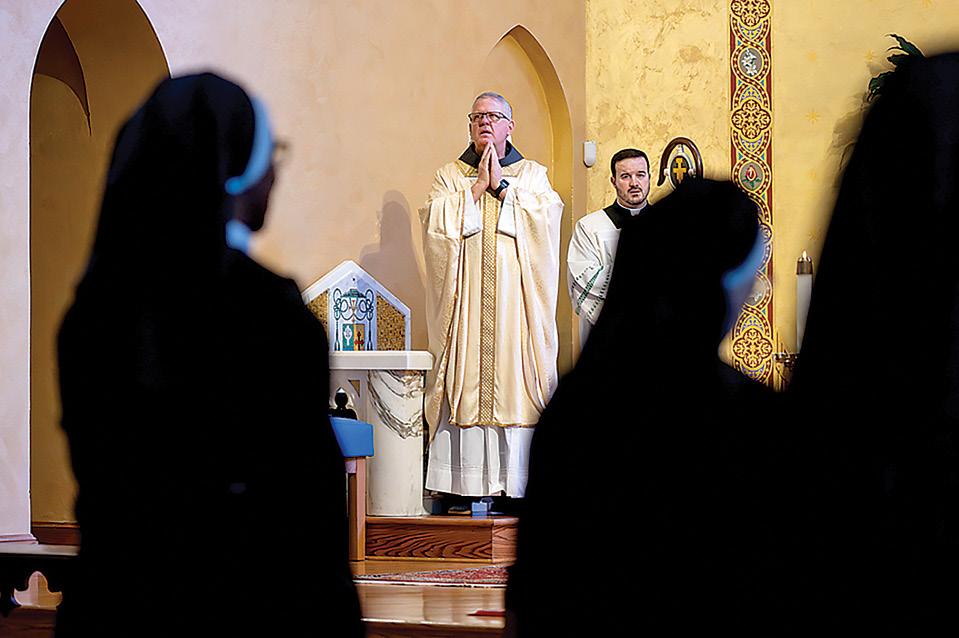
In his homily, Bishop Martin commended all the consecrated men and women serving in the diocese and urged them to remain closely connected to Jesus so that they might be unforgettable examples of blessedness to those they encounter.
“When people look at us, they see blessedness,” he said, referring to the Mass reading from Isaiah 61:9-11. “Our call in life, our call in God’s mighty plan, is that each of you would be able to help (show) what blessedness looks like. We need to be that image in the world.”
And as John’s Gospel (15:1-8) describes Jesus as the vine and us as His branches, those in consecrated life must remain close to Him if they are to bear fruit for the Kingdom, he said.
The world can see the blessedness of consecrated life, he said, because avowed religious are connected to the Body of Christ as a branch is connected to the vine.
“Or dignity as the human person is blessedness, and that blessedness comes only – only – through our constant connection to the vine, to the Father,” Bishop Martin said. “May that be our witness. May people see something special in you and me and say, ‘I want some of that. I want what they have.’”
Even if those people don’t know all the particulars of religious vocations, the bishop said, “They will have come into contact with someone whose very life, whose very presence years later will cause them to question: ‘Who am I? What am I here for? What’s my purpose? Why was that brother, why was that monk, why was that sister, why was that religious priest, why was that Franciscan bishop a part of my life and what did their lives say to me?’”
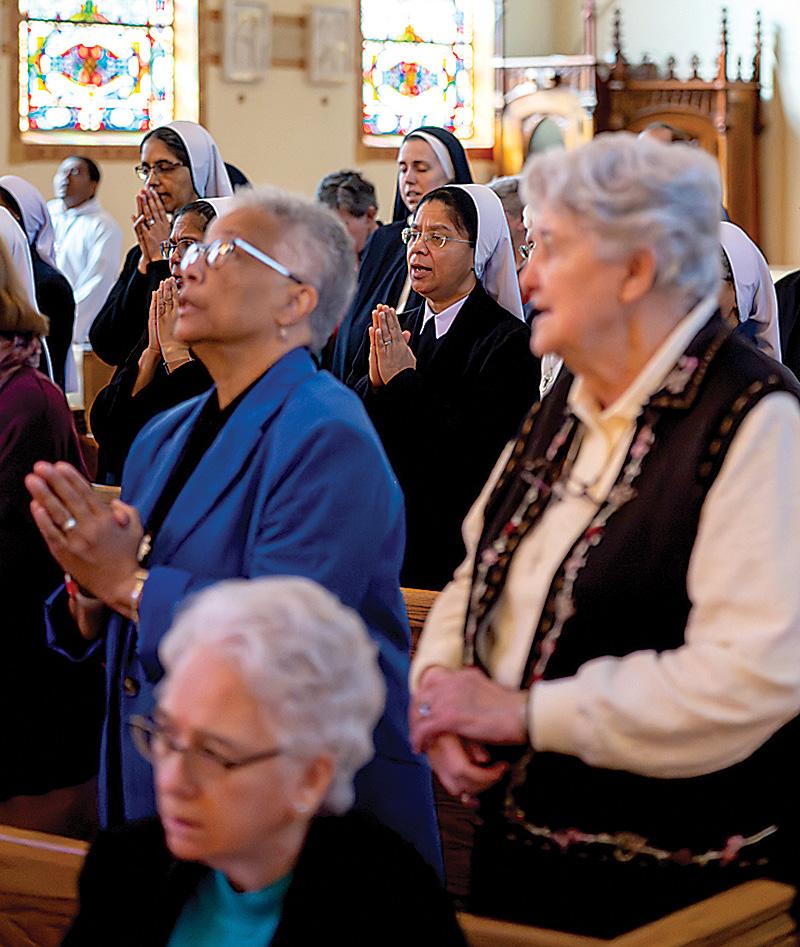
felt uplifted by
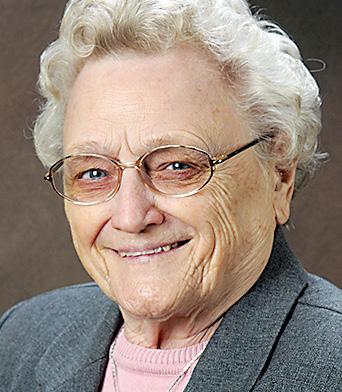
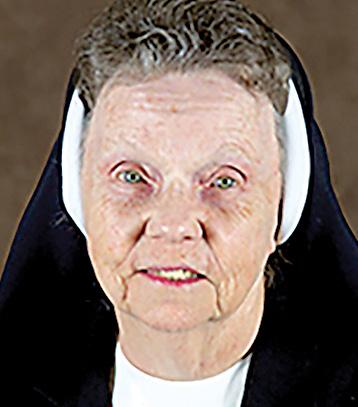
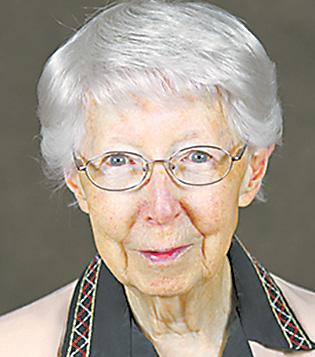
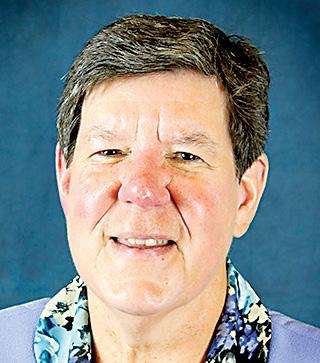
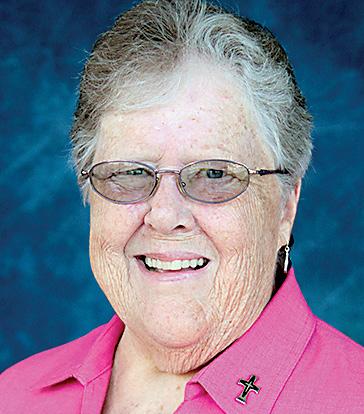
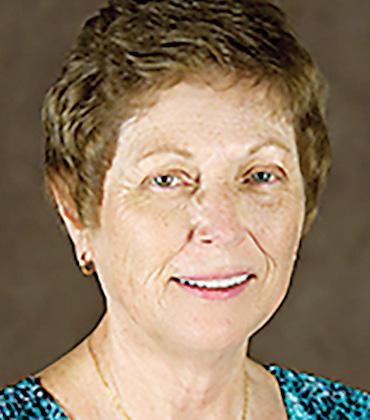
the bishop’s homily.
“All my life, God has done some surprising things, and this is where He wanted me,” she said later. “I feel God moving through me in every way. God has moved me – sometimes kicking,” she smiled.
She converted to Catholicism after being introduced to the faith by a family friend when she was young, and she later joined the Sisters of Mercy. She is now retired after years of teaching grades kindergarten to college.
Many of those present were inspired to join a religious order because of the impact a religious sister or brother made in their lives.
Sister Betty Paul, who is professed with the Sisters of Providence and also celebrating 60 years of consecrated life, received her calling when she was in the seventh grade. A teacher who was a Sister of Providence was a role model and an inspiration for her choice to serve in religious life, she said.
“When I saw her, I thought, ‘This is what I want to do; this is who I want to be,’” she said. “And this has really been a wonderful opportunity. I feel that I have shared my gifts and my talents to the best I was able to after all of these years.”
Sister Betty serves the diocese’s Faith Formation Office as a regional director, training and advising faith formation directors for parishes in the Piedmont-Triad region.
Sister Josna Nedumkandathil, originally from India, who is now a Sister of Charity of St. Vincent de Paul, had that same nudge toward religious life 25 years ago.
The Carmelite sisters at her Catholic school were an example of “blessedness,” she said, and religious life was something she felt called to do. Along with having other responsibilities, Sister Josna now serves as a preschool teacher, inspiring children every day by creating new ways they can learn about the Lord.
“I am so happy, and I am so blessed; this has been a beautiful experience. The best thing about this is I serve God,” she said. “This is something I like to do for God, and I like bringing something new to the people.”
Missionary of Charity Sister Mary Fidelia is a 55-year jubilarian also joyful about her religious vocation. “I am thankful to God that He has called me,” she said.
After Mass, everyone gathered in the cathedral’s fellowship hall to share a meal and more time together, with lots of laughter, hugs and conversation.
Bishop Martin blessed the meal, and in that blessing, he thanked the jubilarians: “We give (God) thanks for our jubilarians, these men and women who have given so faithfully of their lives. They are an inspiration to us.”
While eating dinner, instead of sharing “war stories,” they eagerly shared stories about God’s blessings during their years of consecrated life.
Attendees each left with a parting gift from the bishop: a spice plant, he noted, because they are “the spice of life.”
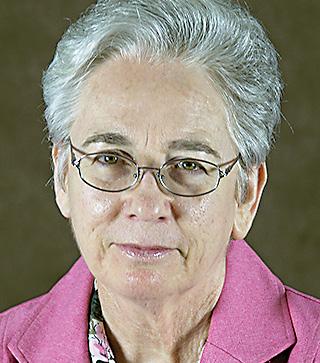
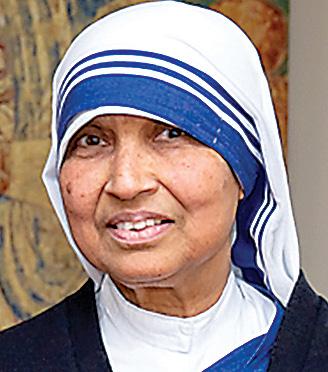
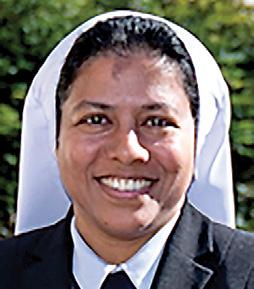
CHARLOTTE — In the hopes of inspiring more young men to heed the call to serve the Church, Judi and Michael Simac have created a $25,000 endowment for St. Joseph College Seminary.
An endowment is a permanent fund, the principal of which is invested – not spent – that generates income to help pay for projects and programs specified by the donor. Endowments are tax deductible and help sustain the strength and viability of the diocese and its entities, paying for capital improvements, charitable outreach, education and parish operations.
In this case, the Simacs wanted to help support the journey of future priests in a concrete way. The endowment will help pay for routine and unexpected future maintenance projects as well as support the building of new facilities, ensuring that the seminary has a solid foundation for future growth.
“The St. Joseph College Seminary is a natural extension for forming holy priests for our diocese as evidenced by existing endowments for the seminary,” Judi Simac said.
The Simacs, who moved to Charlotte in 1987 and are longtime members of St. Patrick Cathedral, were motivated to create this endowment based on their appreciation of priests. They are strong believers in the power of praying for vocations and have a particular love for the Eucharistic Adoration chapel on the campus of Belmont Abbey College.
“We like to believe many priestly vocations, as well as marriages, have their roots at the Belmont Adoration chapel,” she said. She noted that Father Patrick Cahill, pastor of St. Eugene Parish in Asheville, discovered his priestly vocation
in part through the presence of Eucharistic Adoration chapels at St. Gabriel Parish in Charlotte, where he spent time during his childhood and teen years, and later at Belmont Abbey College.
The couple said the creation of the endowment allows them to support their faith, set specific directives for the fund and include it in their estate plans.
“Working with couples like Judi and Michael Simac is so inspiring,” said Gina Rhodes, director of planned giving for the Diocese of Charlotte. “Their thoughtful and prayerful gift to establish an endowment fund to benefit St. Joseph College Seminary is a blessing for current and future students. Just as Jesus said to Simon, ‘Do not be afraid; from now on you will be catching men,’ the Simacs’ gift will help form seminarians into our diocesan priests. And for that, we are most grateful.”
Interested in setting up – or adding to – an endowment to benefit your parish or Catholic school? Establish an endowment in the Diocese of Charlotte Foundation by leaving a bequest in a will, a beneficiary designation from a retirement plan, a trust or annuity, or a gift of real estate, life insurance, cash or securities. Join over 1,700 parishioners who have informed the diocese they plan to remember the Church in their estate plans. For details, contact Gina Rhodes at 704-370-3364 or gmrhodes@rcdoc.org.
WINSTON-SALEM — The evil of human trafficking affects tens of millions of people globally. While January is National Human Trafficking Awareness Month, the Feb. 8 feast of St. Josephine Bakhita, a victim of slavery and the patron saint of human trafficking victims, is also a time for Catholics to reflect and pray for victims of this crime. A Feb. 21 workshop in WinstonSalem will give attendees that opportunity. The United States – including North Carolina – is not immune to this global crime. Tens of thousands of victims across the U.S. are sexually trafficked, and an even larger number suffer under labor trafficking. Both law enforcement and non-profit and governmental agencies combating the issue agree that this crime largely goes unreported, with activities remaining in the shadows in our communities.
Project Light Rowan is a Salisbury-based organization that raises awareness about human trafficking in North Carolina, supports survivors, and through educational events and direct action seeks “to see human trafficking stomped out.” Catholic Charities shares this organization’s work through education events, like one held last November at Sacred Heart Church in Salisbury. On Friday, Feb. 21, there will be another opportunity to hear about Project Light’s work, starting at 11:30 a.m. at the Catholic

CHAPEL HILL — Every Wednesday night, over 100 college students gather at the Newman Catholic Student Center at the University of North Carolina-Chapel Hill for Carolina Catholic Night – a midweek opportunity to grow in faith and friendships, with an opening activity, a student speaker, live music and a student-cooked meal. In January, students were delighted to be joined by Bishop Michael Martin as a guest speaker, and they designed an activity with him in mind: a Charlotte Trivia contest. The final question pitted Bishop Martin against his confrere and former housemate, Friar Tim Kulbicki, OFM Conv., pastor and director of campus ministry at the Newman Center. Bishop Martin shared that he had known Friar Tim since high school. Perhaps that explains the bishop’s overjoyed reaction when he won the round. Bishop Martin read from the fifth chapter of Luke’s Gospel, when Jesus tells Peter: “duc in altum” (“put out into deep water”) and lower his nets. So many fish filled the nets that Peter and Andrew called their friends to help. “I think for many of us in our lives of faith, we are so afraid of what might be in those deep waters,” Bishop Martin said. “But Jesus says to you and to me in multiple ways throughout our lives: ‘duc in altum’ – ‘go deeper.’ Go deeper.” “It meant a lot to see Bishop Mike take time out of his busy schedule and spend some time with us students,” said Patrick Jones, a junior from St. Francis of Assisi Parish in Jefferson. It was nice, he said to “have that reminder to live our faith boldly in the middle of a busy semester.”
Charities Office, located at 1612 E. 14th St. in Winston-Salem. The program, “Stop Human Trafficking – Learn and Take Action,” will begin with a sandwich lunch, followed by a noon presentation by Dr. Jim Duncan, Project Light president and founder. This free presentation will share the realities of human trafficking in the state and focus on ways to stop this crime. Register to attend by emailing scaeducation@ccdoc.org by Wednesday, Feb. 19. More information is online at www.ccdoc.org/education. Because of the subject matter, it is recommended that attendees be at least 16 years old.
Catholic Charities has a volunteer Human Trafficking Awareness Committee that works in liaison with the U.S. Catholic Sisters-sponsored Alliance to End Human Trafficking. Chaired by Catholic Charities volunteer Kara Griffin, a member of St. Francis of Assisi Parish in Lenoir, this committee has developed a webpage with many resources on the topic at www.ccdoc. org/humantrafficking.
JOSEPH PURELLO is director of Social Concerns and Advocacy for Catholic Charities Diocese of Charlotte. More online
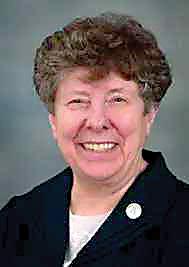

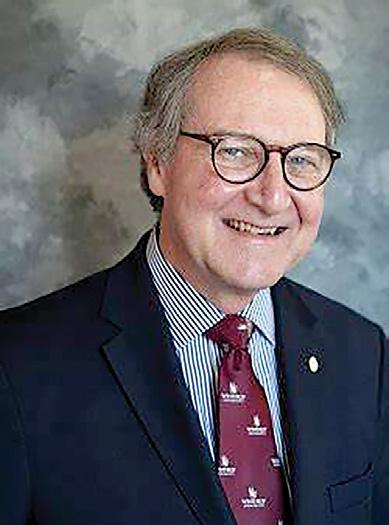

The Jubilee Year of Hope provides an invitation to step outside our daily lives and deepen our faith by going on a pilgrimage. However, traveling to Rome, Jerusalem or other sacred places around the world might not be possible for everyone due to health, finances, family or work commitments.
That doesn’t mean that faithful Catholics need to miss out on the benefits of a Jubilee Year, which happens once every 25 years and offers the opportunity to receive an indulgence. Three local pilgrimage sites –

all listed on the National Register of Historic Places – have been designated in the Diocese of Charlotte: St. Lawrence Basilica in Asheville; Mary, Help of Christians Basilica at Belmont Abbey in Belmont; and St. Patrick Cathedral in Charlotte. As Bishop Martin has shared: “This sacred time is a profound gift, inviting us to renew our faith, seek reconciliation, and rediscover the boundless mercy of God.” Take the time to deepen your commitment to living and proclaiming the Gospel with hope through a local pilgrimage.
St. Lawrence Basilica, Asheville saintlawrencebasilica.org
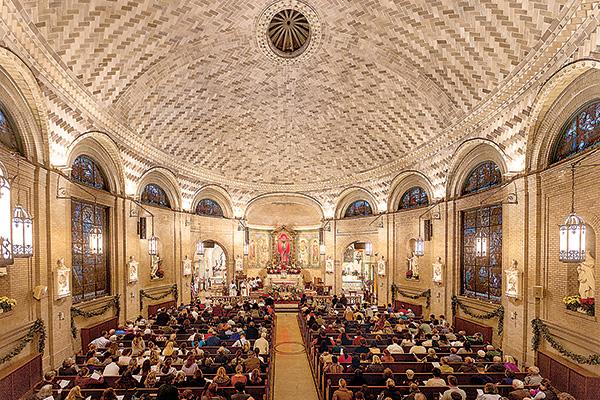
One of two minor basilicas in the Diocese of Charlotte, St. Lawrence was designed and built in 1905 by renowned Spanish architect Rafael Guastavino. Pope John Paul II elevated it to a minor basilica in 1993. The red brick building, built in the Spanish Renaissance style, is capped by a copper dome guarded by statues of St. Lawrence, St. Stephen and St. Aloysius Gonzaga. The 82-footby-58-foot dome, constructed of terracotta tile, is one of the largest free-standing elliptical domes in North America. It features the vaulting technique and herringbone tile pattern that Guastavino used at Grand Central Terminal and Ellis Island’s Registry Room, as well as 200-plus other locations in New York City, and at Asheville’s Biltmore House.
1 3
2
St. Patrick Cathedral, Charlotte stpatricks.org
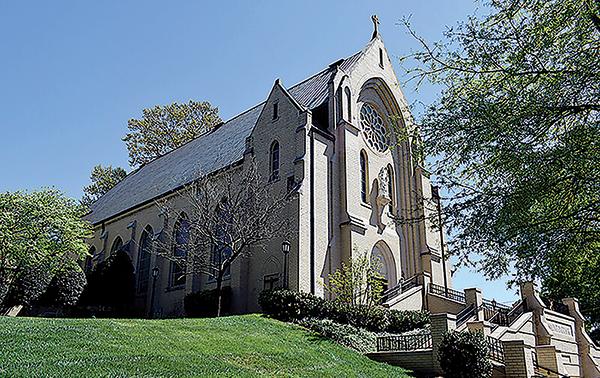
Construction on St. Patrick Church began on March 17, 1938 – St. Patrick’s Day. It was built adjacent to the O’Donoghue School (now St. Patrick School), which had relocated to Dilworth in 1930. Frank E. Frimmer of Austria designed the edifice, and stained glass windows were produced by the Henry Keck Studio in Syracuse, N.Y. Bishop-elect Michael J. Begley selected St. Patrick as the cathedral for the new diocese of Charlotte, and it served as the location for his ordination and installation on Jan. 12, 1972. A $2.6 million project completed in 2024 repaired water damage to the roof and exterior. The plaster walls were repaired so that North Carolina artist Lisa Autry could add detailed artwork on the rib arches and walls, around the windows and –most dramatically – in the sanctuary.
Mary, Help of Christians Basilica at Belmont Abbey, Belmont belmontabbey.org
Belmont Abbey is a monastery of Benedictine monks founded in 1876 that follows the Rule of St. Benedict of Nursia. The Basilica of Mary, Help of Christians is the central structure on the campus. The basilica was built in the neo-Gothic style in 1892 and was completely renovated in 1965. St. Katharine Drexel was one of its benefactors. It features prize-winning painted glass windows and a unique baptismal font made from an old slave auction stone. In 1998 the church was named a minor basilica by Pope John Paul II. Its cemetery contains the graves of Abbot Leo Haid, founding abbot of the monastery, and two of the diocese’s former shepherds: Bishop Michael Begley and Bishop William Curlin.
– Catholic News Herald

At www.charlottediocese.org/jubilee-2025: Learn more about local and international pilgrimages, other pilgrimage sites to visit, how to obtain an indulgence, and upcoming events and celebrations.
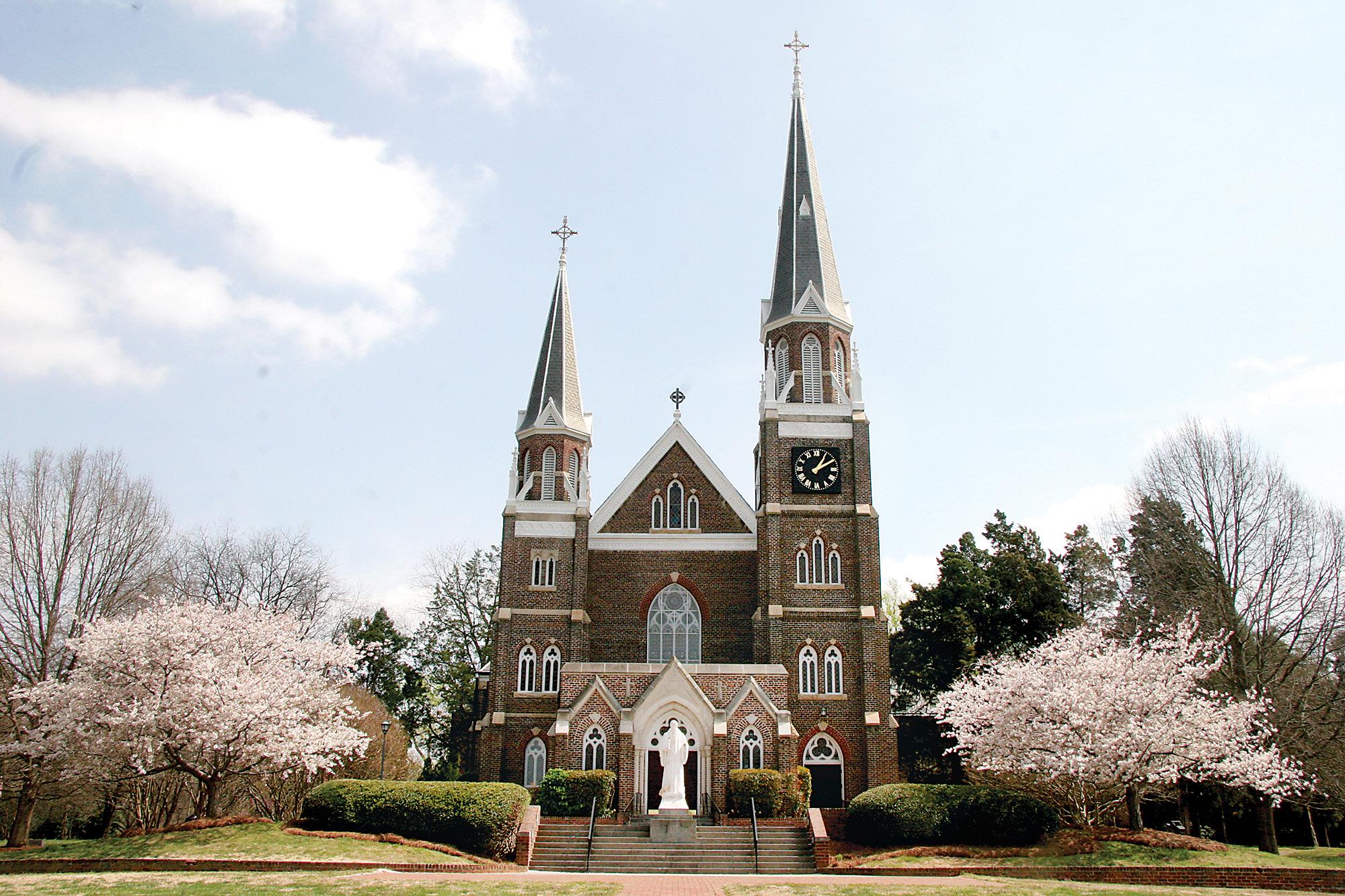

Church leaders are careful to affirm the government’s right to regulate its borders and control immigration and say they don’t condone or counsel anyone to break the law. But the bishops have also implored the government to respect religious freedom, keep families united and, as the Church teaches, always uphold the human rights and dignity of every person.
The pope himself has repeatedly weighed in on the issue. While every nation has the right to defend itself and keep its communities safe, he said in a letter to U.S. bishops issued Feb. 11, “the act of deporting people who in many cases have left their own land for reasons of extreme poverty, insecurity, exploitation, persecution or serious deterioration of the environment, damages the dignity of many men and women, and of entire families, and places them in a state of particular vulnerability and defenselessness,” (Editor’s note: See more on page 21.)
encouraging words in his church bulletin.
“This (bulletin) and the letter from the bishops has brought people a bit of joy,” says Hispanic Ministry Coordinator Ibis Centeno, “because they feel that there is some solidarity.”
Father Peter Ascik, who pastors a church of 400 families, about half of them Hispanic, says, “People have expressed anxiety and uncertainty about what’s going to happen and who is going to be targeted. There are concerns that people will be targeted at church, or trying to get to church, and they might be afraid to come to church events because of that risk.”
That’s disconcerting, Father Ascik says, because “the Catholic Church affirms that, whether documented or undocumented, migrants have a right to receive spiritual care without fear and for their family integrity to be respected.”
Father Ascik calls it a privilege to serve the immigrant community. “I have come to know they are hard-working, faith-filled and family-oriented. They are a vital part of our parish, and many have been contributing to our local community for years.”
Churches also are sharing practical advice:
n Keep your car in good working order.
n Make sure the license plate is current.
n Don’t speed and obey all traffic signs and laws.
n Carry your identification everywhere. Police recommend a passport.
n Designate a family meeting place and have a plan in case one of you is detained.
n Be courteous if you are stopped by police.
“I know there’s a lot of stress when you are stopped by the police,” Officer Claudio Jiménez told visitors at Our Lady of Guadalupe. But he noted traffic stops are stressful for police, too, because they never know what they might encounter.
BELMONT — Sister Mary Andrew Ray, a beloved member of the Sisters of Mercy and devoted educator, passed away peacefully, surrounded by the love of her community, on Feb. 8, 2025.
A Mass of Christian Burial was celebrated Feb. 13, 2025, at Sacred Heart Convent (Cardinal Gibbons Chapel) in Belmont. Interment followed at Belmont Abbey Cemetery.
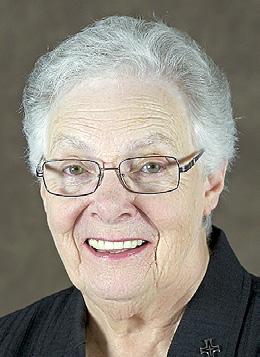
Hazel Rita Ray was born Jan. 30, 1935, at Mercy Hospital in Charlotte, the youngest of four children to Frederick C. Ray, originally from Waycross, Georgia, and Helen Kidd Ray of Charlotte. The Ray family was also one of the founding members of St. Patrick Catholic Parish (now St. Patrick Cathedral) in Charlotte.
A dedicated student and spirited teenager, she attended St. Patrick School, formerly known as the O’Donoghue School, where her love for learning and passion for helping others first blossomed. After many hints from several Sisters of Mercy, she entered the Sisters of Mercy in 1952, marking the beginning of a remarkable journey of service and education.
She earned a Bachelor of Arts in Social Studies from Sacred Heart College/ Belmont Abbey College. With an unwavering commitment to education, she played a pivotal role in implementing an English as a Second Language program while ministering at Sacred Heart College. Her dedication to teaching ESL students
led her to pursue a master’s degree in English as a Second Language at St. Michael’s College in Colchester, Vermont. Throughout her illustrious career, Sister Mary Andrew touched countless lives as she taught at various Catholic schools in North Carolina, including St. Mary’s in Wilmington, St. Michael’s in Gastonia, Our Lady of the Assumption in Charlotte, St. Gabriel’s and St. Patrick’s, to list a few. She also served at the former military academy in Belmont, North Carolina, which was run by the Sisters of Mercy. An active and dedicated member of the Sisters of Mercy, she held the position of secretary general and worked as the director of special services at Sacred Heart College. One of her greatest passions was serving as the assistant archivist at Sacred Heart Convent, where she worked tirelessly to preserve the stories and legacies of the sisters.
As she embraced her illness in her final years, Sister Mary Andrew remained a beacon of hope and strength, inspiring all who knew her with her motto, “Jesus, I trust in You.” Her unwavering faith and compassion shone brightly through her service to the community, and she will be remembered as a true embodiment of mercy and love. Her spirit of service and love will live on in the hearts of all who were blessed to know her.
She is survived by her devoted cousins, nephews, nieces and her beloved sisters of the Sisters of Mercy community. In lieu of flowers, the family kindly requests that donations be made either to the Sisters of Mercy, 101 Mercy Dr., Belmont, N.C. 28012, or to the Parkinson’s Foundation (www.parkinson.org). — Catholic News Herald
Trump administration officials have clashed openly with the U.S. bishops, questioning their motives and threatening to cut federal funding to Catholic Charities over its service to legal refugees brought to the country by the U.S. government. Despite misinformation that causes confusion, Church funding is not used to facilitate immigration by people who are coming to the country without government approval. Nevertheless, no matter what someone’s legal status is, the Church provides the sacraments as well as humanitarian relief at its food pantries, clothing closets and other services.
Inside churches, clergy throughout the diocese are also expressing support from the pulpit and in other ways. A Mooresville pastor is among those who shared

“We are not ICE,” Jiménez said. CharlotteMecklenburg Police do not function as immigration officers and are not required to assist in federal operations. “We do not take people for not having a driver’s license, but we need to identify you,” he said.
St. Peter, the oldest active parish in the diocese, operates a robust social justice ministry that includes outreach and assistance for legal refugees, but also advocates for the humane treatment of undocumented immigrants.
“We know it is a trying time and we are here to help people because the ramifications of this are enormous,” says Jesuit Father Tim Stephens, pastor. “We read the horror stories and try to figure out our role in all this, and I’d say it is probably to help wherever we can, even if it is just holding someone’s hand while justice or inevitability takes its course.”
— César Hurtado, Lisa Geraci and OSV News contributed.


LISA GERACI lmgeraci@rcdoc.org
CHARLOTTE — Applications for North Carolina Opportunity Scholarships for the 2025-26 school year are now open, and families with students enrolling in any of the Diocese of Charlotte’s 20 Catholic schools are encouraged to apply soon.
The priority deadline is 5 p.m. Thursday, March 6.
Opportunity Scholarships can provide significant financial assistance toward private school tuition and fees for grades K-12. Awards range from approximately $3,000 to $7,000, based on a family’s household income and when they apply.
A companion program, the Education Student Account Scholarship (ESA+), has the same application window and provides financial assistance for private school and homeschool tuition for students with special needs.
Financial assistance provided through both programs can have a meaningful impact for families who want to provide their child with a Catholic education, which in the diocese ranges from approximately $5,000 to $13,000 per year for registered Catholic families, depending on the school and grade level.
“Expanding access to school choice ensures that every family, regardless of income, can choose the best educational environment
for their children,” said Dr. Greg Monroe, the diocese’s superintendent of schools. “We encourage every family to apply and explore the possibilities available to them.”
Parents may not realize that many of the Opportunity Scholarship program’s previous hurdles, such as income and enrollment requirements, have been eliminated and funding for the upcoming school year has been increased.
Opportunity Scholarships are awarded on a four-tiered system according to household income, with families in lower income brackets receiving higher priority.
Families will receive notification of the amount they qualify for by April, and offers to previous scholarship recipients are already being sent.
The Opportunity Scholarship program was introduced in 2013 to pave the way for low-income students at low-performing public schools to attend a private school of their choice. Since then, the state Legislature has gradually increased funding and broadened application criteria.
A decade after Opportunity Scholarships were launched, during the 2023-24 school year, participation in the program had grown to 32,549 participants statewide with funding totaling $185 million. In the Charlotte diocese, 832 out of 8,169 enrolled students – roughly 10% – received funding totaling more than $5.4 million.
After North Carolina relaxed eligibility requirements last year, more families have qualified for Opportunity Scholarships to attend Catholic schools in the Charlotte diocese. Opportunity Scholarship applications for the 2025-26 school year opened Feb. 6. The priority deadline to apply is Thursday, March 6.
School
Asheville Catholic School, Asheville
Bishop McGuinness Catholic High School, Kernersville
Canongate Catholic High School, Arden
Charlotte Catholic High School, Charlotte
Christ the King Catholic High School, Huntersville
Holy Trinity Catholic Middle School, Charlotte
Immaculata Catholic School, Hendersonville
Immaculate Heart of Mary Catholic School, High Point
Our Lady of Grace Catholic School, Greensboro
Our Lady of Mercy Catholic School, Winston-Salem
Our Lady of the Assumption Catholic School, Charlotte
Sacred Heart Catholic School, Salisbury
St. Ann Catholic School, Charlotte
St. Gabriel Catholic School, Charlotte
St. Leo Catholic School, Winston-Salem
St. Mark Catholic School, Huntersville
St. Matthew Catholic School, Charlotte
St. Michael Catholic School, Gastonia
St. Pius X Catholic School, Greensboro
St. Patrick Catholic School, Charlotte
Total
$109,700 $66,545
$74,468 $205,325 $1,030,541 $68,840 $1,613,236 $997,341 $1,366,670 $147,249 -$58,280 $587,556 $266,563 $320,444 $415,552 $574,898 $1,041,500 $517,997 $1,711,036 $1,101,872 $296,086 $273,155 $419,956 $18,339,843 $5,442,306 $12,897,537
Source: www.ncseaa.edu/opportunity-scholarship-summary-of-data
Additional funding and revisions to the state’s 2023 Appropriations Act created more opportunities. Income requirements were lifted, and prior enrollment in a public school was no longer required. The changes dramatically increased Opportunity Scholarship application numbers and awards for students to attend private schools, including the diocese’s Catholic schools. While enrollment increased by 146 students across the diocese in 2024-25, many schools saw double to 10 times the number of Opportunity Scholarships over
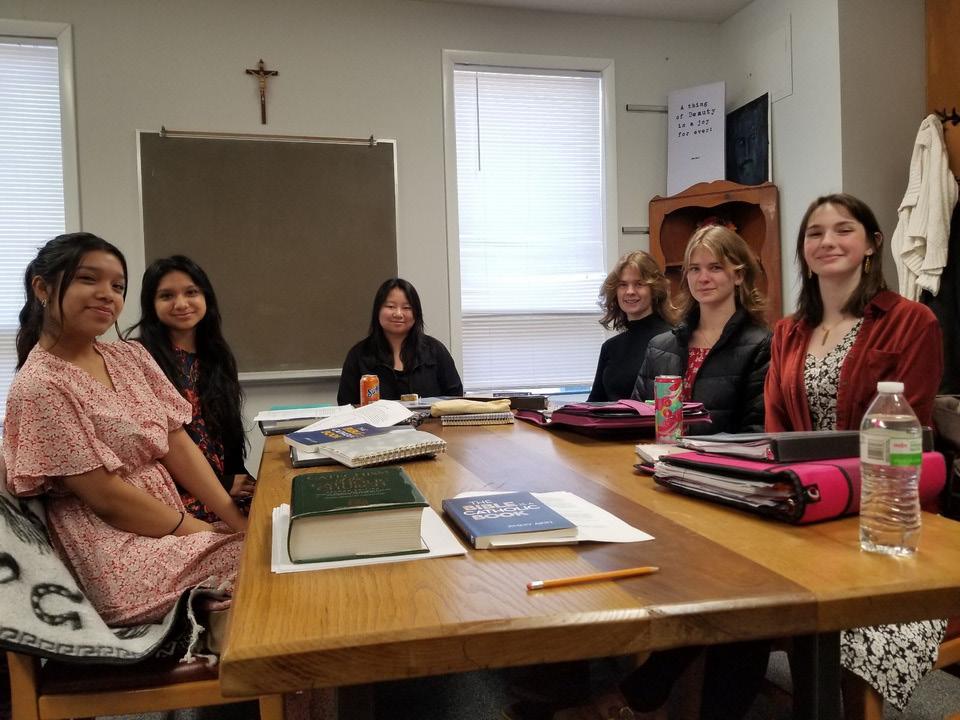
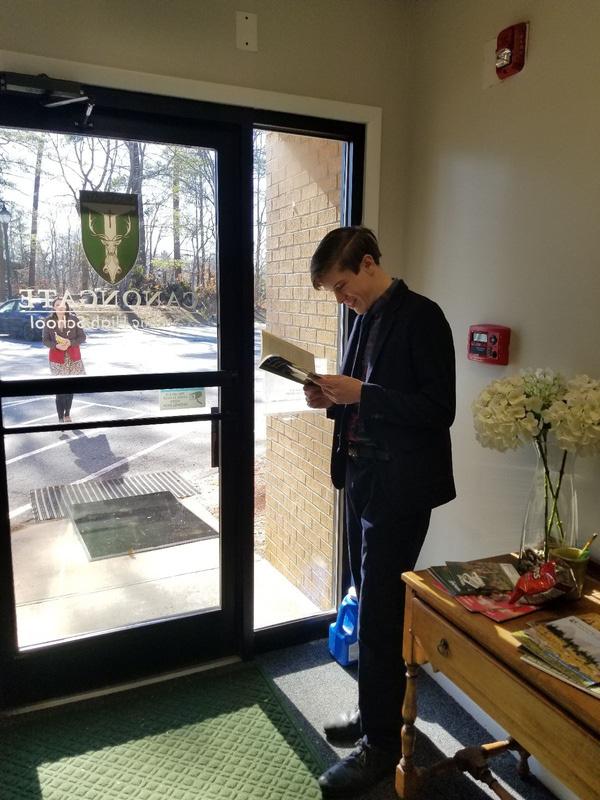
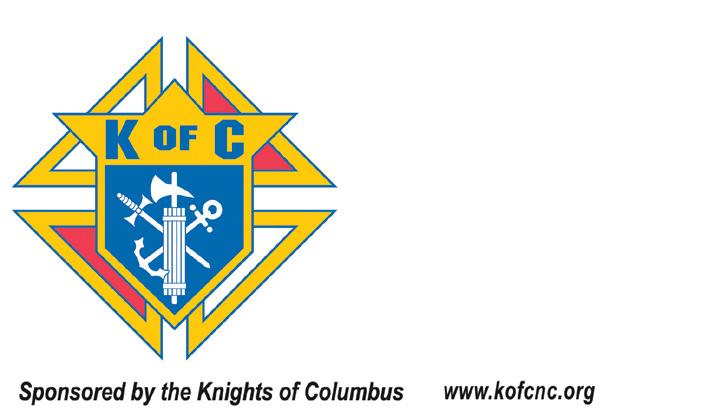
the prior year. For example, St. Gabriel School in Charlotte went from awards to families totaling $66,545 to $1,108,045, and St. Mark School in Huntersville went from $317,934 to $2,028,970. The 2025 spring semester funds are still being distributed, but in total, schools were awarded $18,339,843, a $12,897,537 increase over last year and a tremendous savings for parents. Because of changes in the requirements, the 2024-25 school year yielded 79,372 eligible applicants, which created a waitlist of 54,000. To clear that list, legislators passed House Bill 10 to add an additional $463 million for the Opportunity Scholarship program. More online

Bishop Michael J. Begley - 2002
Rev. Edward Beatty - 1990
Rev. Thomas P. Clements - 2023
Rev. Kenneth Geyer, OSB - 2012
Rev. Lawrence Hill - 1985
Rev. David Kessinger - 2021
Rev. Msgr. Anthony Kovacic - 2015
Rev. Kieran Neilson, OSB - 2019
Rev. Arthur Pendleton, OSB - 2020
Rev. Joseph J. Waters - 2015
At www.k12.ncseaa.edu : Get more information about the N.C. Opportunity Scholarship program, review
and apply online

Los obispos de N.C. emiten su primera declaración conjunta: La inmigración
CHARLOTTE — En una declaración conjunta emitida el miércoles 5 de febrero, los dos obispos católicos de Carolina del Norte instaron a su millón de seguidores a reflexionar sobre la enseñanza de la Iglesia sobre la inmigración, enfatizando el imperativo moral de proteger los derechos humanos de los inmigrantes mientras se respetan las leyes y las fronteras. También reiteraron el llamado de larga data de los obispos de EE.UU. por una reforma del sistema de inmigración del país.


El tema de la política y la aplicación de la inmigración es tan complicado como emocional”, dijeron los obispos de las dos diócesis de Carolina del Norte, el Obispo Michael Martin de Charlotte y el Obispo Luis Zarama de Raleigh, en su primera declaración conjunta desde que Martin fue ordenado el pasado mayo.
“Aunque estamos de acuerdo en que hay espacio para el desacuerdo y la discusión con respecto a la política de inmigración”, los obispos alentaron a las personas a participar en “una reflexión y formación personal sobre estos temas”.
“Como miembros de la familia humana, cada individuo merece y debe recibir la dignidad que no solo apoya y fomenta el bien común de nuestra sociedad”, dijeron, “sino que también refleja la realidad de que todos somos fundamentalmente hermanos y hermanas en el Señor”.
Enfatizaron la necesidad de una reforma migratoria basada en los principios de la doctrina social católica:
n Las personas tienen derecho a migrar para sustentar sus vidas y las de sus familias.
n Un país tiene derecho a regular sus fronteras y controlar la inmigración.
n Un país debe regular sus fronteras con justicia y misericordia.
n Las protecciones humanitarias para las familias vulnerables deben ser una prioridad.
— Catholic News Herald Más online
En www.catholicnewsherald.com : Lea la declaración completa.

‘No tengan miedo’
De los pastores al Papa, la Iglesia insta a la compasión hacia los inmigrantes
LIZ CHANDLER lchandler@rcdoc.org
CHARLOTTE — Líderes eclesiásticos y laicos de toda la Diócesis de Charlotte están brindando apoyo espiritual y orientación práctica a los inmigrantes preocupados por ser detenidos por las acciones de cumplimiento de inmigración prometidas por el presidente Donald Trump.
Hasta ahora, los operativos de la Oficina de Inmigración y Control de Aduanas de Estados Unidos (ICE) no se han materializado localmente, y la mayoría de los pastores informan pocos cambios en la asistencia a Misa. Sin embargo, más de una docena de sacerdotes, trabajadores de Caridades Católicas y del Ministerio Hispano entrevistados dicen que los inmigrantes y sus familias viven con miedo, evitan viajar cuando no es esencial y toman medidas para protegerse, como investigar sus derechos, buscar un estatus documentado y orientar sus gastos hacia la reparación de sus autos para no atraer a la policía con problemas mecánicos.
En todo el país, algunos inmigrantes están faltando al trabajo o a la escuela cuando la actividad de ICE parece cercana, según informan los medios. Localmente, incluso los inmigrantes que son ciudadanos naturalizados llevan sus documentos oficiales a todas partes. Sacerdotes en las áreas de Charlotte y Greensboro están asesorando a los padres que luchan por explicar a sus hijos la amenaza potencial sin traumatizarlos.
“Muchas personas tienen miedo, especialmente los niños que se preguntan qué pasaría si ICE se lleva a su mamá o papá, o a ambos juntos”, dijo el Diácono Enedino Aquino, coordinador del Ministerio Hispano de la Vicaría de Greensboro.
Entre otras medidas dirigidas a los inmigrantes, la administración de Trump rescindió una política de larga data que restringía el cumplimiento de inmigración en “lugares sensibles” como iglesias, escuelas y hospitales.
Aun así, los inmigrantes están recurriendo a la Iglesia en busca de apoyo. Y ella está respondiendo.
En Charlotte, una parroquia predominantemente hispana organizó recientemente una charla con oficiales de la policía de Charlotte-Mecklenburg para inmigrantes. Otras parroquias están ofreciendo seminarios sobre “Conozca sus derechos”. Los rumores están extendidos, advirtiendo falsamente sobre redadas pendientes y contando historias de crímenes contra los inmigrantes. El sacerdote de una parroquia de las montañas llamó a los departamentos del sheriff de varios condados para preguntar sobre sus políticas. Otro se comprometió a “defender” a las familias de su parroquia “hasta las últimas consecuencias”.
“Estamos aquí para ayudarles, no para hacerles daño”, dijo la oficial de CMPD Verónica Cruz a los más de 200
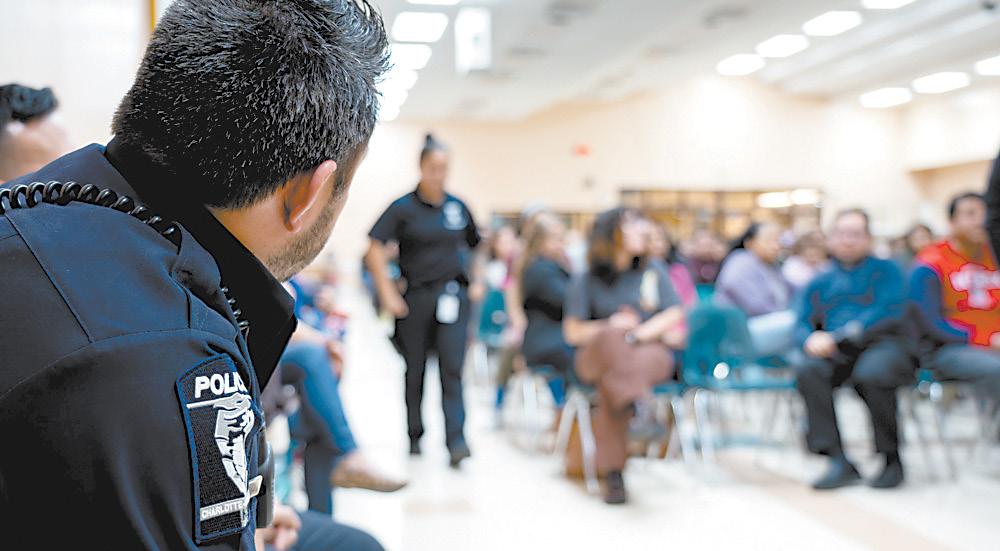
y 200 miembros de la comunidad
el 6 de febrero en la Iglesia de Nuestra Señora de Guadalupe para una conversación
inmigrantes que se reunieron el 7 de febrero en la Iglesia Nuestra Señora de Guadalupe para conocer más sobre la policía local.
Ella señaló que un alarmante porcentaje de los robos son cometidos contra los hispanos y que Charlotte ha visto una disminución notable en los informes de crímenes, ya que muchos hispanos temen que su estatus migratorio pueda ser cuestionado si llaman a la policía.
El Padre vicentino Marvin Navas presentó a los cinco oficiales de policía en el evento como “amigos” de la comunidad e instó a la multitud a orar por ellos porque sus deberes diarios implican peligro.
“Vine con miedo, y me voy más tranquilo”, dijo Dilman, un feligrés de Guatemala que solo dio su primer nombre, después de la presentación.
“Estoy satisfecho con las respuestas que nos dieron”, dijo Juan Esteban Tirado, también presente. “Ahora, como dicen, sin miedo ni preocupación, llevaré esta información a mis amigos y familiares”.
‘RECIBIENDO AL EXTRANJERO’
A lo largo del país, la Iglesia está desafiando políticas y proporcionando consejos prácticos a los inmigrantes.
De costa a costa, los obispos católicos se han pronunciado en contra de la deportación masiva y la persecución en áreas sensibles para los operativos migratorios.
“Estamos con ustedes”, dijo el obispo de Charlotte, Michael Martin, en un mensaje a los inmigrantes días antes de la inauguración. “No tengan miedo.”
En un otro mensaje, el 5 de febrero, el Obispo Martin y el Obispo de Raleigh, Luis Zarama, publicaron una declaración conjunta, diciendo: “Nuestras oficinas de Caridades Católicas están listas para ayudar con alimentos y otras necesidades
básicas para todas las familias. Como católicos, abogamos por el reconocimiento de que los inmigrantes, como miembros de la familia humana de Dios, merecen y deben recibir la dignidad adecuada como nuestros hermanos y hermanas en el Señor. Jesús mismo fue refugiado y nos enseñó a dar la bienvenida al extranjero y a darnos cuenta de que, al recibir al extranjero, estamos recibiendo al mismo Cristo”.
Los líderes eclesiásticos tienen cuidado de afirmar el derecho del gobierno a regular sus fronteras y controlar la inmigración y dicen que no aprueban ni asesoran a nadie para que rompa la ley. Pero los obispos también han implorado al gobierno que respete la libertad religiosa, mantenga a las familias unidas y, como enseña la Iglesia, siempre defienda los derechos humanos y la dignidad de cada persona.
El propio Papa Francisco se ha pronunciado repetidamente sobre el tema. Si bien cada nación tiene derecho a defenderse y mantener sus comunidades a salvo, dijo en una carta a los obispos de Estados Unidos emitida el 11 de febrero, “el acto de deportar a personas que en muchos casos han dejado su propia tierra por razones de extrema pobreza, inseguridad, explotación, persecución o grave deterioro del medio ambiente, daña la dignidad de muchos hombres y mujeres, y de familias enteras, y los coloca en un estado de vulnerabilidad y desamparo particular” (Ver carta página 21). Los funcionarios de la administración Trump han chocado abiertamente con los obispos de Estados Unidos, cuestionando sus motivos y amenazando con recortar los fondos federales a Caridades Católicas por su servicio a los refugiados legales traídos al país

Ya estamos a mitad de febrero y todavía no sé que voy a hacer para crecer espiritualmente este año. Para muchos esta puede ser la situación en este momento. Para ayudar un poco a resolver esta incertidumbre permítanme proponerles algunas recomendaciones que a mí me sirven.
La primera, es conocernos y saber que nos gusta, que podemos hacer y que se nos facilita. Por ejemplo, si yo quiero crecer espiritualmente leyendo un libro pero reconozco que me aburre leer pues me será muy difícil. En cambio, si me es fácil escuchar, pues la solución puede ser conseguir un audiolibro. Conocer nuestras fortalezas y debilidades nos ayuda a planificar mejor como mejorar en la vida espiritual.
La segunda, es poner las cosas en concreto y por escrito. Es decir, si solamente buscamos en nuestra imaginación que nos gustaría hacer, en la mayoría de los casos termina siendo solo un sueño, una idea bonita o incluso una frustración por nunca haberlo logrado. Escribir una lista también nos ayuda a ser más específicos. Por ejemplo: quiero este año leer dos libros de santos, voy a ir a la Misa más seguido, voy a ayunar los martes y los viernes, voy a aprender la oración de San Francisco de Asís, etc.
La tercera, es elegir solo una o dos cosas que sean realistas dependiendo del tiempo y la disponibilidad de cada uno y tomar acción. Si decidí leer un libro, pues necesito comprarlo lo más pronto posible; si decidí ir a la Santa Misa más seguido, necesito ponerlo en mi calendario ¡Ya! ¡Ahora mismo!; si decidí ayunar dos días de la semana, necesito planificar dónde y qué comeré esos dos días; si decidí aprender una oración, necesito hacer varias copias y ponerlas en puntos estratégicos y visibles de mi quehacer diario. Por último debemos recordar que las prácticas espirituales y el crecimiento en la Fe son instrumentos que nos acercan más a Dios y esa debe ser siempre nuestra meta. Si al final de leer un libro puedo decir que mi amor o mi entendimiento hacia Dios crecieron, sí que estoy progresando. Bendiciones para todos los que lean este artículo.
EL PADRE MIGUEL SÁNCHEZ es secretario del
CÉSAR HURTADO rchurtado@rcdoc.org
CHARLOTTE — En un día lleno de compañerismo, amistad y oración, más de 250 hombres asistieron a la 15 Conferencia Anual de Hombres de las Carolinas el 8 de febrero en la Iglesia Santo Tomás de Aquino. El tema de la conferencia, “¿A Quién Sirves?”, reflejaba su propósito de unir cuerpo, alma y mente en un todo coherente en la vida diaria de los hombres católicos.
El Obispo Michael Martin, quien tomó la palabra poco después de arribar apenas pasadas las 10 de la mañana, invitó a los hombres a unirse para tomar un papel activo en la construcción del reino de Dios en este mundo.
“Estoy muy contento de ver a tantos hombres venir a fortalecer su fe en la compañía de otros”, dijo el Obispo Martin. “Dios nos ha dado lo que necesitamos para ser creadores con Él. Somos co-creadores con Él. ¡Imaginen ese poder! ¿Estamos listos para construir este nuevo cielo con Él?” preguntó.
El Obispo Martin saludó calurosamente al Obispo Jacques Eric Fabre-Jeune, de la Diócesis de Charleston, quien celebró la Misa para los asistentes, y compartieron algunos momentos que hicieron reír a la multitud. El Obispo Fabre-Jeune centró la mayor parte de su homilía en los jóvenes, quienes, dijo, necesitan toda nuestra atención. Invitó a dos jóvenes, que llevaban la imagen de Nuestra Señora de Guadalupe en la procesión de entrada, a acompañarlo y les hizo varias preguntas durante su homilía. Usando el ejemplo de sus asignaciones que lo llevaron a muchos países, enfatizó la universalidad de la Iglesia Católica. Cuando alguien te juzga por ser diferente, dijo, no respondas de la misma manera, no los juzgues.
“¿Qué vas a decir?” preguntó. “¡No uses tus propias palabras! Usa las palabras de las escrituras: Di que amas a Dios sobre todas las cosas y amas a tu prójimo como a ti mismo”.
Después de las palabras de bienvenida y la oración, John Frankman, un capitán militar
por el gobierno norteamericano. A pesar de la desinformación que causa confusión, los fondos de la Iglesia no se utilizan para facilitar la inmigración de personas que llegan al país sin la aprobación del gobierno. Sin embargo, sin importar el estatus legal de la persona, la Iglesia proporciona los sacramentos, así como asistencia humanitaria en sus despensas de alimentos, roperos y otros servicios.
Dentro de las iglesias, el clero de toda la diócesis está expresando apoyo desde el púlpito y de otras maneras. Un pastor de Mooresville es uno de los que compartió palabras de aliento en el boletín de su iglesia. “Este (boletín) y la carta de los obispos ha traído algo de alegría a la gente”, dijo la coordinadora del Ministerio Hispano Ibis Centeno, “porque sienten que hay algo de solidaridad”.
El Padre Peter Ascik, que pastorea una iglesia de 400 familias, aproximadamente la mitad de ellas hispanas, dijo: “He escuchado ansiedad e incertidumbre sobre lo que va a pasar y quién será el objetivo. Están particularmente preocupados de que las personas serán
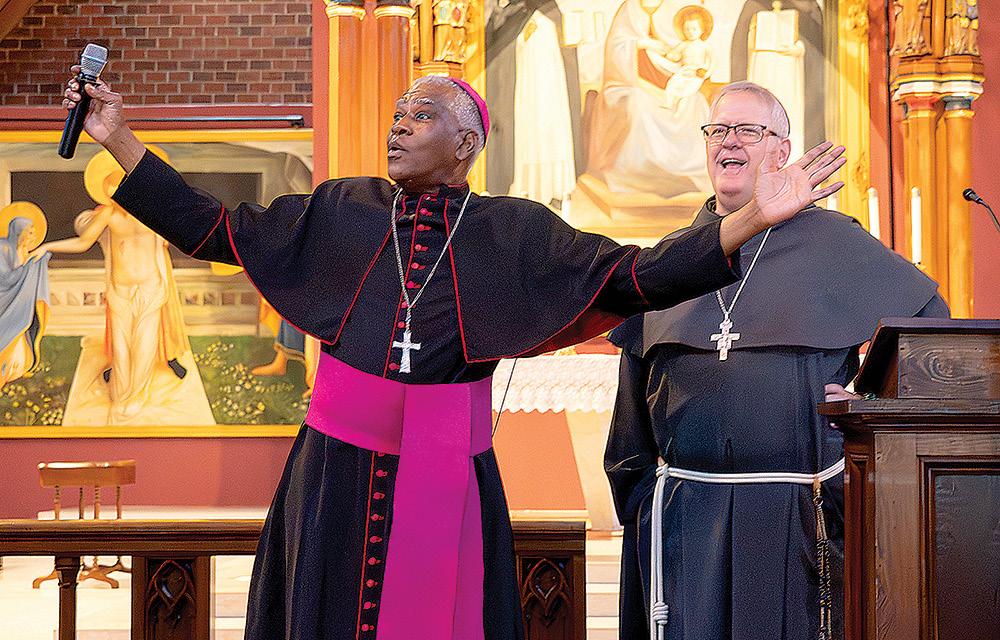
y activista que se convirtió a la fe católica, dio inicio a la conferencia propiamente dicha. Frankman tiene una maestría en teología sistemática, una disciplina de la teología cristiana que proporciona una explicación ordenada, racional y coherente de las doctrinas de la fe cristiana. Le siguió John Edwards, quien compartió su testimonio personal de conversión a la fe católica en 2013. Edwards, originario de Alabama, sirvió en la Marina de los Estados Unidos y como oficial de policía en Birmingham. Él y su esposa, Coni, crearon una iglesia no denominacional que atendía a más de 500 personas antes de su conversión. Después del almuerzo, se presentó E-Knock, un orador y rapero católico. Fawaz Yasi, verdadero nombre del artista, es un cristiano sirio del norte de Irak que emigró
detenidas en la iglesia, o tratando de llegar a la iglesia, y pueden tener miedo de venir a los eventos de la iglesia por ese riesgo”.
Eso es preocupante, dice el Padre Ascik, porque “la Iglesia Católica afirma que, tanto si están documentados como si no, los migrantes tienen derecho a recibir cuidado espiritual sin miedo y que se respete la integridad de su familia”.
El Padre Ascik considera un privilegio servir a la comunidad inmigrante. “He llegado a conocer que son personas trabajadoras, llenas de fe y orientadas a la familia. Son una parte vital de nuestra parroquia, y muchos han estado contribuyendo a nuestra comunidad local durante años”.
Las iglesias también están compartiendo consejos prácticos:
n Mantenga su coche en buen estado de funcionamiento.
n Asegúrese de que la matrícula esté al día.
n No exceda los límites de velocidad y obedezca todas las señales de tráfico y leyes.
n Lleve su identificación en todo momento.
La policía recomienda el pasaporte.
n Designe un lugar de reunión familiar y tenga un plan en caso de que alguno de ustedes sea detenido.
n Sea cortés si es detenido por la policía.
“Sé que hay mucho estrés cuando alguien es detenido por la policía”, dijo el oficial
a los Estados Unidos con su familia a la edad de cinco años. Apasionado por la agricultura familiar, la Iglesia, el ministerio juvenil y la música rap, lanzó su último álbum, Book of Eknock, en iTunes bajo la categoría de Top Christian and Gospel. La conferencia de un día también ofreció Adoración, Rosario y una bendición por la tarde.
Uno de los asistentes, Freddy García, miembro de los Caballeros de Colón en Hickory, expresó su agradecimiento por la inspiración y motivación que recibió durante la conferencia. “El mensaje del Obispo Martin me impactó,” dijo García. “Nunca antes había pensado que Dios me había puesto en este mundo para trabajar en Su viñedo como hombre, y ser co-creador de la vida con Él.”
Claudio Jiménez a los visitantes en Nuestra Señora de Guadalupe. Pero señaló que las paradas de tráfico también son estresantes para la policía, porque nunca saben lo que pueden encontrar.
“No somos ICE”, dijo Jiménez. La policía de Charlotte-Mecklenburg no actúa como agentes de inmigración y no está obligada a ayudar en operaciones federales.
“No detenemos a las personas por no tener licencia de conducir, pero necesitamos identificarlas”, explicó.
San Pedro, la parroquia activa más antigua de la diócesis, opera un robusto ministerio de justicia social que incluye apoyo y asistencia a refugiados legales, pero también aboga por el trato humano de los inmigrantes indocumentados.
“Sabemos que es un momento difícil y estamos aquí para ayudar a la gente porque las ramificaciones de esto son enormes”, dijo el Padre jesuita Tim Stephens, párroco. “Leemos las historias horrorosas e intentamos averiguar cuál es nuestro papel en todo esto, y diría que probablemente es ayudar donde podamos, incluso si es solo tomarle la mano a alguien mientras la justicia o lo inevitable sigue su curso”. — César Hurtado, Lisa Geraci y OSV News contribuyeron.
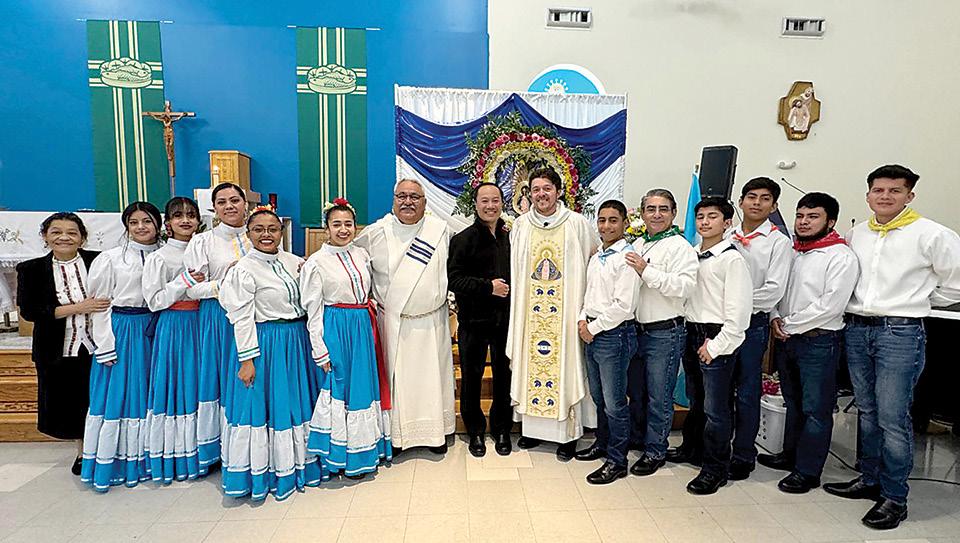
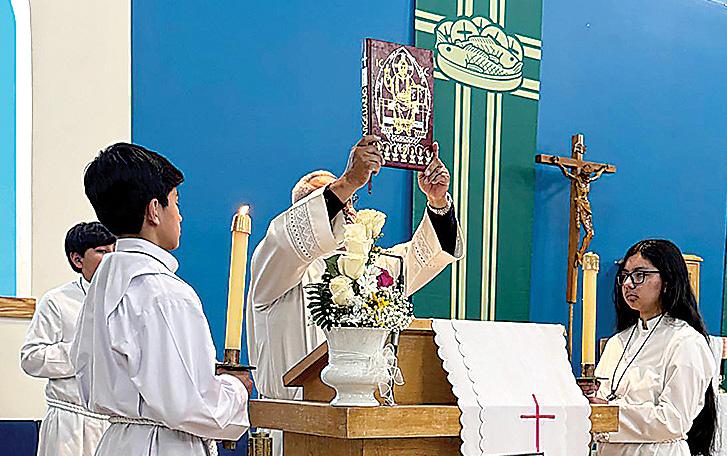
EVELYN BERMÚDEZ
Especial para Catholic News Herald
Suyapa, Honduras, Quebrada del Piliguín, 1747: Año en que se escribe una nueva historia de fe, esperanza y oportunidad de conocer a Nuestra Madre Santísima en todo su esplendor. Se revela por primera vez en esta nación en una pequeñita imagen de madera que mide alrededor de seis centímetros y medio de alto, con su vestido en color palo rosa cubierto con un manto que reflejaba una noche oscura llena de estrellas, como en el momento de su aparición a los jóvenes Colindres y Martínez.
Hoy, 278 años después, seguimos venerando a la Madre de Jesús en la advocación de Nuestra Señora Virgen de Suyapa, el día 3 de febrero de cada año. Fue declarada Patrona de Honduras por el Papa Pío XI en 1925, y conmemoramos hoy 100 años desde que se le confirió ese título.
MADRE DE TODOS
Sin importar nacionalidad o raza, aquí en la parroquia Santa María en Greensboro, nos regocijamos en celebrar por cuarto año consecutivo a nuestra Madre Santísima, Patrona de Honduras, este pasado sábado primero de febrero, en un evento organizado por la feligresa y colaboradora Ana Corea.
Feligreses hondureños y de otros países como México, El Salvador, Santo Domingo,
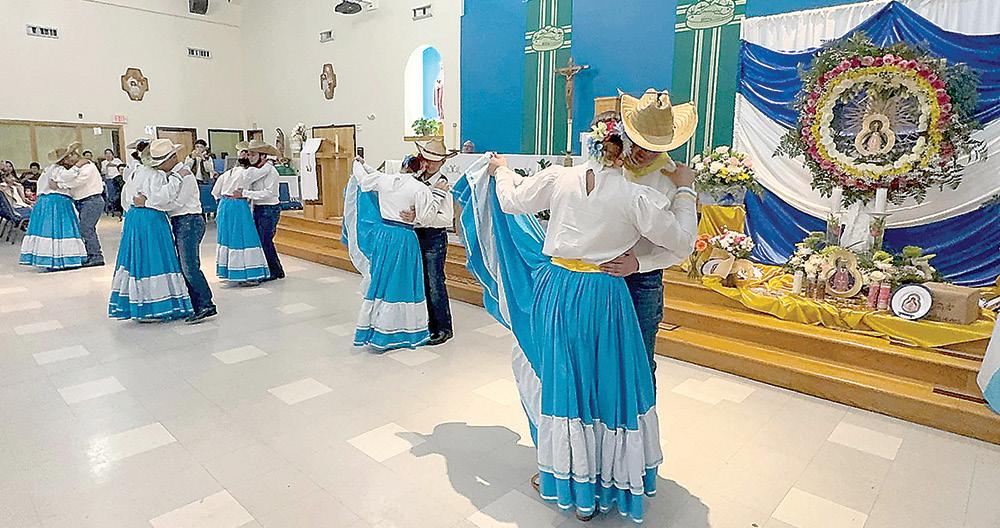
La comunidad hispana en general ofreció un sentido y cariñoso homenaje a la Virgen de Suyapa, patrona de Honduras, encarnada en una pequeña imágen en madera de unos pocos centímetros.
Costa Rica, Nicaragua, Colombia y muchos más, iniciaron felizmente la festividad regalándole un ramillete de rosas a nuestra Madre Celestial con el rezo del Santo Rosario, seguido de la celebración de la Santísima Eucaristía presidida por el Padre Alexander Palacios C.M., en compañía del concelebrante, párroco Juan Timlin C.M., y el Diácono Enedino Aquino. La liturgia fue amenizada con hermosas
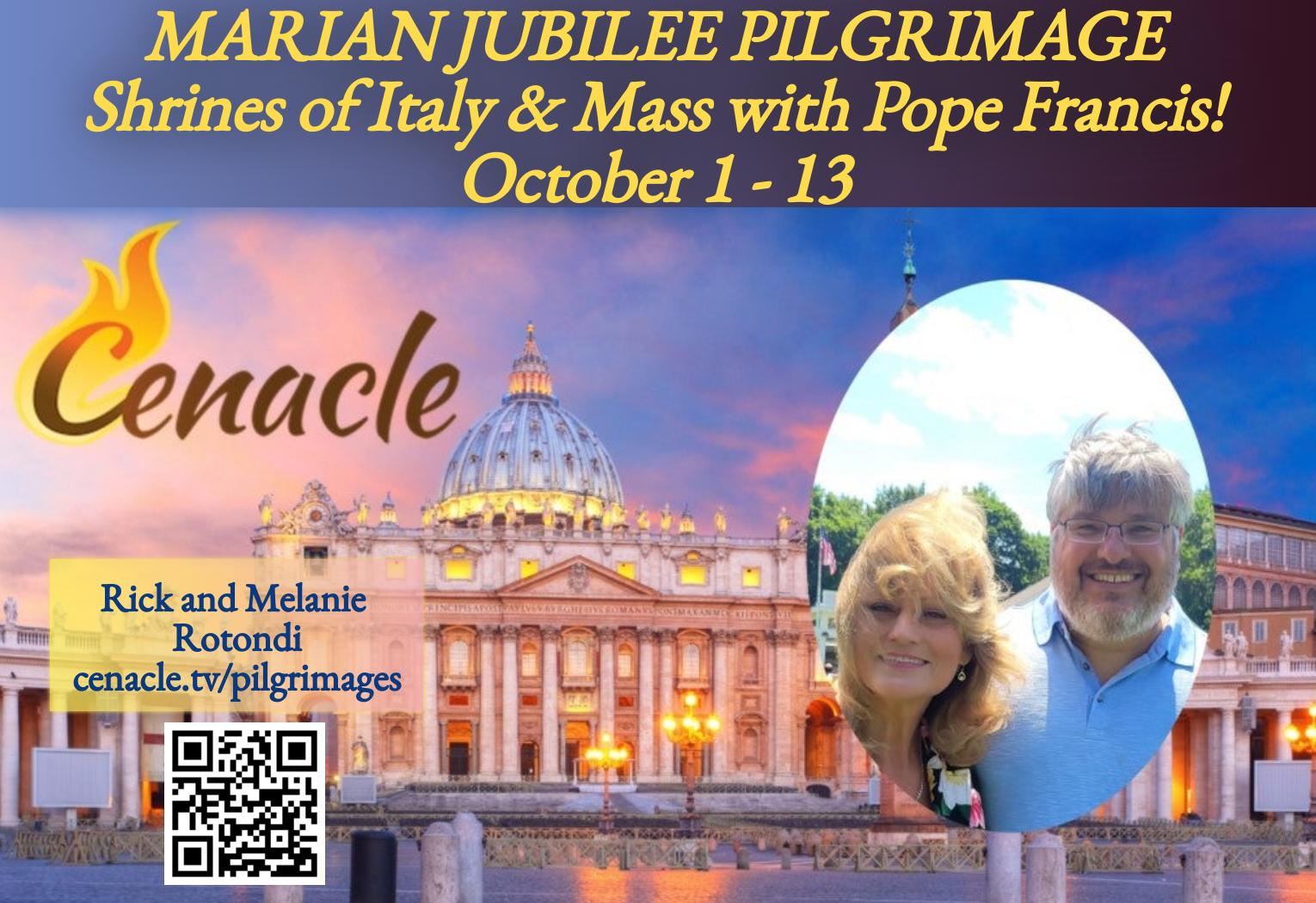
alabanzas interpretadas por el coro de Burlington ‘Son de Cristo’, bajo la dirección de Daniel Flores.
En esta Santa Misa tuvimos la oportunidad de conocer más detalles de
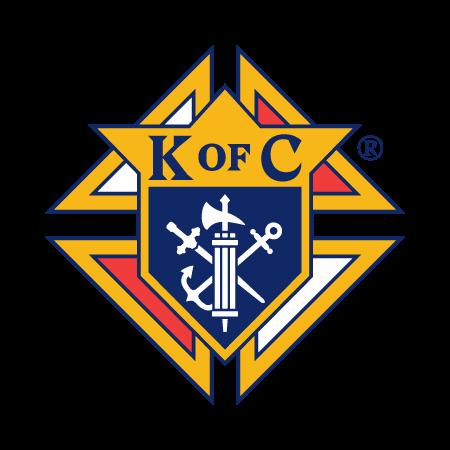

la historia de “La Morenita”, así llamada por quienes le tienen un profundo cariño y respeto.
En la presentación de los dones, jóvenes y familias de la comunidad entregaron las 12 estrellas que representan a los doce Apóstoles, las 12 tribus de Israel, que es el pueblo elegido de Dios.
El Rosario, representando las rosas a modo de oración; las flores, en recuerdo de la creación de Dios y la belleza de su obra; las velas, simbolizando a Jesús, la luz del mundo; y el pan y el vino, Cuerpo y Sangre de Jesucristo, alimento sagrado de nuestras almas fortalecidas por el Espíritu Santo.
La tarde finalizó con un convivio donde todos pudieron deleitarse con una muestra de la rica cultura hispana, destacando bailables folclóricos presentados los grupos de danzas ‘Suyapa’, ‘Los Viejitos’, ‘Los MiniViejitos de Santa María’ y el grupo de danza mariana ‘Las Hijitas de María’.
Además, se disfrutó de ricos platillos hondureños como tamales de pollo envueltos en hoja de plátano, las deliciosas ‘baleadas de frijol y queso’, típica horchata, y hasta un rico champurrado de grano.
Consider joining the over 2 million members of the largest, lay Catholic order in the world by signing up online today at: www.kofc.org/joinus
LISA GERACI lmgeraci@rcdoc.org
CHARLOTTE — Miembros de órdenes religiosas se reunieron en la Catedral San Patricio el 1 de febrero en una Misa especial ofrecida por el primer obispo de la Diócesis de Charlotte que, al igual que ellos, eligió la vida consagrada.
La Misa especial por la Jornada Mundial de la Vida Consagrada, instituida por San Juan Pablo II en 1997, es una oportunidad para reconocer y dar gracias por todos los religiosos y religiosas que sirven a la Iglesia. La liturgia del sábado, para aquellos que ministran en la Diócesis de Charlotte, fue la primera para el Obispo Michael Martin, quien profesa como franciscano conventual y fue ordenado obispo de Charlotte hace unos ocho meses.
Asistieron a la celebración medio centenar de hombres y mujeres de órdenes como los monjes benedictinos de la Abadía de Belmont y las Hermanas de la Misericordia, cuyas comunidades vienen sirviendo en el oeste de Carolina del Norte durante más de 100 años, hasta comunidades más recientes como los Misioneros de los Pobres en Monroe y las Hermanas de la Caridad de San Vicente de Paúl en Archdale. Nueve religiosos fueron honrados como “jubilares”, aquellos que celebraban un hito especial en sus vidas consagradas.
En su homilía, el Obispo Martin elogió a todos los hombres y mujeres consagrados que sirven en la diócesis y los instó a permanecer estrechamente conectados con Jesús para que puedan ser ejemplos de bendición para aquellos con los que se encuentren.
“Cuando la gente nos mira, ve bienaventuranza”, dijo, refiriéndose a la lectura de Isaías 61:9-11. “Nuestro llamado en la vida, nuestro llamado en el poderoso plan de Dios, es que cada uno de ustedes sea capaz de ayudar (mostrar) cómo es la bienaventuranza. Tenemos que ser esa imagen en el mundo”.
Como el Evangelio de Juan (15:1-8) describe a Jesús como la vid y a nosotros como sus sarmientos, los que están en la vida consagrada deben permanecer cerca de Él si quieren dar fruto para el Reino, dijo. El mundo puede ver la bendición de la vida consagrada, señaló, porque los religiosos declarados están conectados al Cuerpo de Cristo como un sarmiento está
MOORESVILLE — La comunidad de la parroquia Santa Teresa ha venido organizando en la celebración de la presentación del Señor desde la festividad de Cristo Rey. Aunque pequeña en número de miembros, los feligreses hispanos siempre se esfuerzan por estar unidos en hermandad y construyendo comunidad. La Santa Misa en Español del pasado 2 de febrero fue celebrada por el Reverendo Padre Engelbert Ofon, vicario parroquial, quien al término de la liturgia pidió a todos los niños presentes que se acercaran para darles una bendición especial, además de entregar a la ‘Virgen Peregrina’ a la familia que esa semana se la llevaría a casa. Luego, todos pasaron al Salón Familiar a compartir tamales, chocolate, champurrado de avena y de tamarindo. “Este último sabor estuvo muy rico, delicioso”, dijo alegremente Ibis Centeno, coordinadora del ministerio hispano de la vicaría de Salisbury. Todos los niños asistentes recibieron regalos de frutas y golosinas. Y, por supuesto, estuvieron presentes los vicarios parroquiales, Padres Huver Navarro y Engelbert Ofon que compartieron con la comunidad.
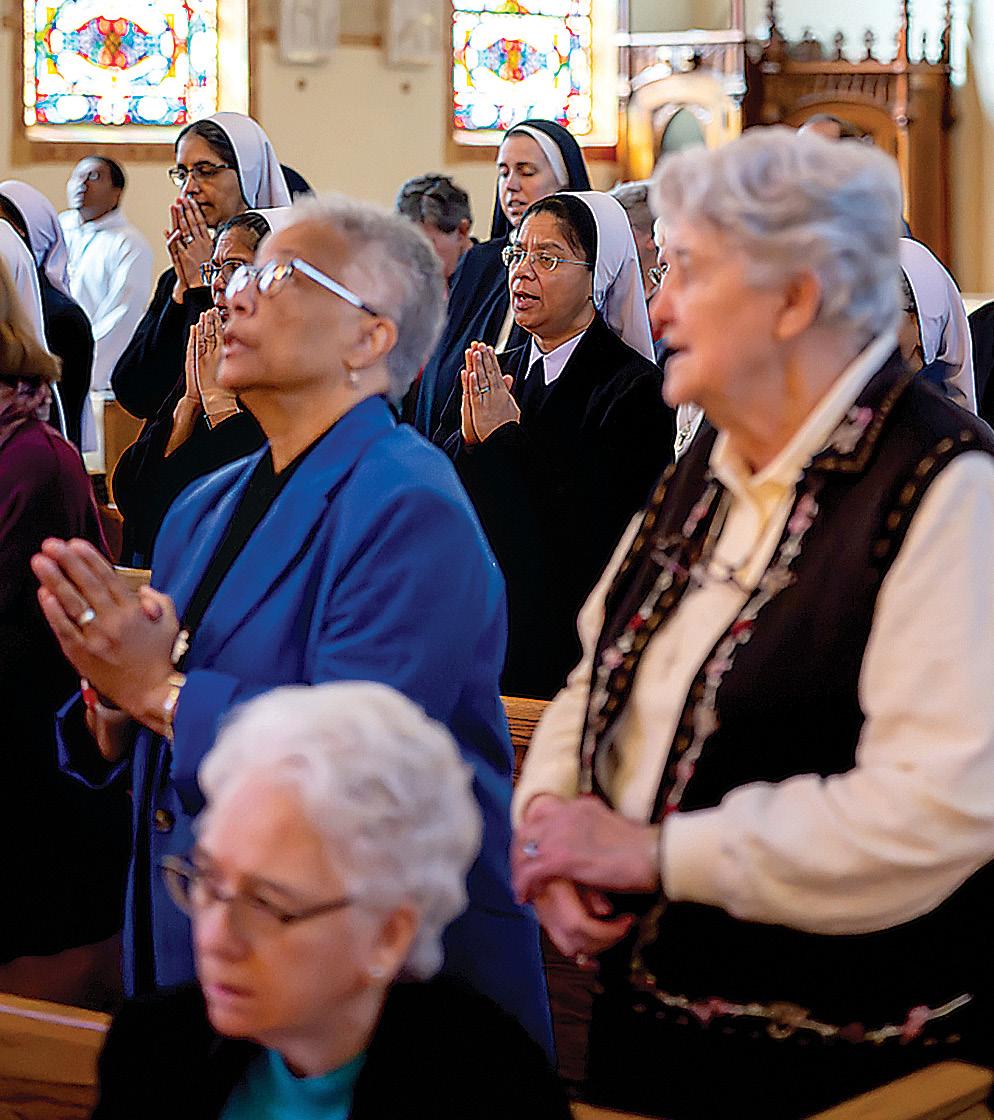
Las hermanas de las Hermanas de la Misericordia rezan y cantan himnos junto a sus hermanos y hermanas de otras órdenes religiosas en la Misa anual de la Vida Consagrada, en la que presidió el obispo Michael Martin.
conectado a la vid. “Así como la dignidad como persona humana es una bienaventuranza, esa bienaventuranza viene sola a través de nuestra conexión constante con la vid, con el Padre”, dijo el Obispo Martin. “Que ese sea nuestro testimonio. Que la gente vea algo especial en ustedes y en mí y diga: ‘Quiero algo de eso. Quiero lo que ellos tienen’”.
Aunque esas personas no conozcan todas
las particularidades de las vocaciones religiosas, dijo el obispo, “ellos habrán entrado en contacto con alguien cuya sola presencia años después les hará preguntarse: ‘¿Quién soy yo? ¿Para qué estoy aquí? ¿Cuál es mi propósito? ¿Por qué ese hermano, por qué ese monje, por qué esa hermana, por qué ese sacerdote religioso, por qué ese obispo franciscano formaba parte de mi vida y qué me decían sus vidas?’”.
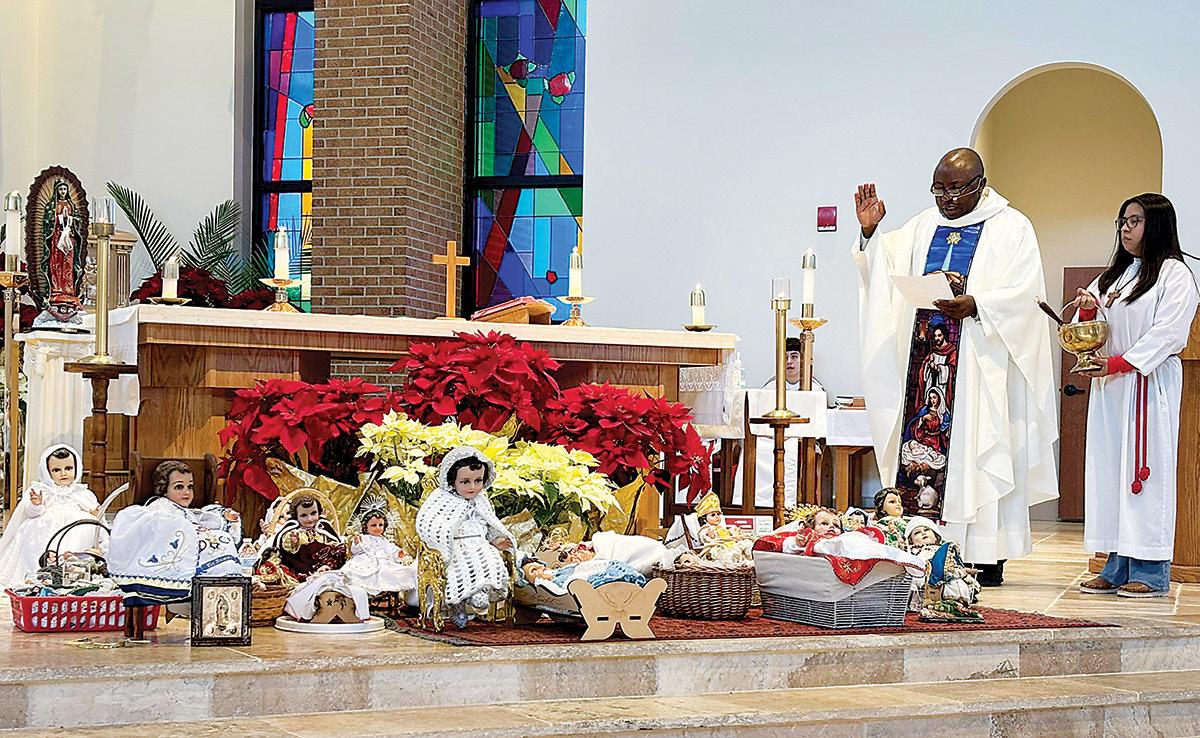
La Hermana de la Misericordia Margaret Mary Wharton, que está celebrando 60 años de vida consagrada, se sintió animada por la homilía del obispo.
“Toda mi vida, Dios ha hecho algunas cosas sorprendentes, y aquí es donde Él me quería”, dijo más tarde. “Siento que Dios se mueve a través de mí en todos los sentidos. Dios me ha movido, a veces pateando”, sonrió.
Se convirtió al catolicismo después de ser presentada a la fe por un amigo de la familia cuando era joven, y más tarde se unió a las Hermanas de la Misericordia. Ahora está jubilada después de años de enseñar desde el jardín de infantes hasta la universidad. Muchos de los presentes se sintieron inspirados a unirse a una orden religiosa debido al impacto que una hermana o hermano religioso tuvo en sus vidas.
La hermana Betty Paul, que profesa con las Hermanas de la Providencia y que también celebra 60 años de vida consagrada, recibió su llamado cuando estaba en séptimo grado. Una maestra, una Hermana de la Providencia, fue un modelo a seguir y una inspiración para su elección de servir en la vida religiosa, dijo. “Cuando la vi, pensé: ‘Esto es lo que quiero hacer; esto es lo que quiero ser’”, dijo. “Y esta ha sido realmente una oportunidad maravillosa. Siento que he compartido mis dones y mis talentos lo mejor que he podido después de todos estos años”.
La Hermana Betty sirve en la Oficina de Formación en la Fe de la diócesis como directora regional, capacitando y asesorando a los directores de formación en la fe para las parroquias de la región de Piedmont-Triad.
La hermana Josna Nedumkandathil, originaria de la India, que ahora es Hermana de la Caridad de San Vicente de Paúl, tuvo ese mismo impulso hacia la vida religiosa hace 25 años.
Las hermanas carmelitas de su escuela católica eran un ejemplo de “bienaventuranza”, dijo, y la vida religiosa era algo a lo que se sentía llamada. Además de tener otras responsabilidades, la hermana Josna ahora sirve como maestra de preescolar, inspirando a los niños todos los días al crear nuevas formas en que pueden aprender acerca del Señor.
“Estoy tan feliz y bendecida; ha sido una experiencia muy bonita. Lo mejor de esto es que sirvo a Dios”, dijo. “Esto es algo que me gusta hacer para Dios, y me gusta traer algo nuevo a la gente”.
La Misionera de la Caridad, Sor Mary Fidelia, es una jubilar de 55 años, también alegre de su vocación religiosa. “Estoy agradecida a Dios por haberme llamado”, dijo.
Después de la celebración de la Misa, todos se reunieron en un salón de la catedral para compartir el almuerzo y más tiempo juntos, con muchas risas, abrazos y animada conversación.
El Obispo Martin bendijo la comida, y en esa bendición, agradeció a los jubilares: “Damos gracias por nuestros jubilares, estos hombres y mujeres que han dado tan fielmente sus vidas. Son una inspiración para nosotros”.
Mientras cenaban, compartían con entusiasmo historias sobre las bendiciones de Dios durante sus años de vida consagrada.
Cada uno de los asistentes se fue con un regalo de despedida del obispo: una planta de especias, porque son “la especia de la vida”.

Cada 14 de febrero, el mundo celebra San Valentín, una fecha que, aunque de origen religioso, ha sido transformada en un evento comercial donde el amor se mide en regalos. Sin embargo, la historia de San Valentín y otros santos que dieron su vida por la verdad del amor nos invita a mirar más allá de la superficialidad y redescubrir su verdadero significado.
San Valentín, sacerdote del siglo III, fue martirizado por casar en secreto a jóvenes en una época en que el emperador Claudio II prohibía los matrimonios entre soldados. También San Juan Bautista entregó su vida denunciando el adulterio de Herodes y defendiendo la sacralidad del matrimonio. Estos testigos de la fe nos recuerdan que el amor es un llamado divino que requiere fidelidad, compromiso y respeto mutuo. Hoy, en nuestra sociedad, es urgente recuperar el verdadero sentido del amor. Este no es solo una emoción pasajera ni la búsqueda del placer, sino una decisión que implica entrega y sacrificio. La atracción entre el hombre y la mujer es más que un fenómeno biológico o psicológico: es una vocación a la complementariedad y la construcción de familias sólidas.
San Pablo nos da una definición del amor cristiano en 1 Corintios 13:4-7: “El amor es paciente, es bondadoso. No tiene envidia, no presume, no se engríe…”. Estas palabras nos invitan a examinar si nuestro amor es auténtico o si nos dejamos llevar por una visión egoísta. El Papa Francisco ha insistido en que el matrimonio es una escuela de amor, donde la diferencia entre el hombre y la mujer no es una competencia, sino un enriquecimiento mutuo. En un mundo donde se promueve la lucha de sexos, es vital recordar que Dios nos creó diferentes para complementarnos, no para enfrentarnos.
Pero San Valentín no es solo un llamado al amor matrimonial, sino a vivir el amor en todas sus formas. Jesús nos enseñó: “Nadie tiene amor más grande que el que da la vida por sus amigos” (Juan 15:13). Como cristianos, estamos llamados a amar a nuestra pareja, familia, amigos y a quienes sufren.
Para rescatar el espíritu de esta fecha, podemos practicar gestos sencillos pero significativos: dedicar tiempo de calidad a la pareja, escribir una carta sincera, orar juntos y reflexionar sobre el proyecto de vida compartido. También podemos extender el amor cristiano visitando enfermos, ayudando a quienes están solos o participando en la Eucaristía, fuente del amor más grande. Que este día sea una oportunidad para volver a la esencia del amor cristiano: un amor que no busca su propio interés, sino el bien del otro; un amor que edifica, respeta y dignifica. Así daremos testimonio de que el amor verdadero sigue siendo posible, incluso en un mundo que ha perdido su significado.
EL PADRE JOSÉ GREGORIO GARCÍA RUBIO es vicario de la parroquia Nuestra Señora de Guadalupe en Charlotte.

Imagen de San Valentín de autor desconocido. A nivel estilístico, ha sido relacionada con el círculo de Bartolomé Bermejo y con Tomás Giner, dos atribuciones poco convincentes. Todo parece indicar que se trata de un artista que trabajó en Aragón a finales del siglo XV, en la línea del activo taller de Martín Bernat.
FEBRERO 16-22
Domingo: Jeremías 17:5-8, Del Salmo 1, 1 Corintios 15:12. 16-20, Lucas 6:17. 20-26; Lunes: Génesis 4:1-15. 25, Salmo 49:1 y 8. 16bc-17. 20-21, Marcos 8:11-13; Martes: Génesis 6:5-8; 7:1-5. 10, Salmo 28:1a y 2. 3ac-4. 3b y 9b-10, Marcos 8:14-21; Miércoles: Génesis 8:613. 20-22, Salmo 115:12-13. 14-15. 18-19, Marcos 8:22-26; Jueves: Génesis 9:1-13, Salmo 101:16-18. 19-21. 29 y 22-23, Marcos 8:27-33; Viernes: Génesis 11:1-9, Salmo 32:10-11. 12-13. 14-15, Marcos 8:34–9:1; Sábado (Fiesta de la Cátedra de San Pedro, Apóstol): 1 Pedro 5:14, Salmo 22:1-3a. 3b-4. 5. 6, Mateo 16:13-19
Cada 14 de febrero la Iglesia Católica recuerda a San Valentín, obispo y mártir. El patrono de los enamorados nació en el año 175 (otras fuentes consignan el año 197) en la ciudad de Terni, a sesenta millas de Roma, Italia, donde actualmente yacen sus restos debajo de uno de los altares laterales de la Basílica que lleva su nombre.
En el siglo III, en tiempos en los que se perseguía a los cristianos, San Valentín se consagró al servicio de la comunidad eclesial de su ciudad natal. Como obispo de Terni, antes Interamna, arriesgó su vida muchas veces para administrar los sacramentos. Se dice que tenía predilección por unir a las parejas en santo matrimonio, pues eso multiplicaba el deseo en otros de constituir un hogar cristiano.
A San Valentín le encantaban las flores y solía regalarlas a las parejas que se comprometían para casarse, como expresión de su deseo de que tengan una vida feliz juntos.
Cuenta la tradición que el emperador romano Claudio II, con el propósito de evitar que las familias cristianas se multiplicaran, prohibió la celebración de todo matrimonio cristiano. Además, tenía la convicción de que los soldados casados no solían ser lo suficientemente aguerridos, puesto que se hallaban emocionalmente sometidos a una familia.
Entonces, llegó a oídos del emperador que el obispo Valentín había casado a un legionario converso con una joven cristiana, acto que consideró una afrenta directa contra su autoridad. Pronto dio la orden de ubicar y apresar al obispo. Así que el santo fue encarcelado y luego llevado a la vía Flaminia, cerca de la Puerta del Pueblo en Roma, donde sería azotado.
Para evitar tumultos o protestas de quienes apreciaban al obispo, Claudio decidió ejecutarlo y enterrar sus restos en secreto. La tradición señala que el obispo San Valentín murió decapitado el 14 de febrero del año 273. Una versión muy popular señala que, pasado un tiempo prudente, tres discípulos suyos lograron ubicar y desenterrar su cuerpo, y lo llevaron de regreso a su ciudad para darle una sepultura digna.
UNA FIESTA CON SENTIDO
La fiesta de San Valentín recuerda el sentido del auténtico amor entre quienes están llamados a la vida matrimonial y a formar una familia. La figura del obispo mártir nos recuerda, además, que el amor no es solo un sentimiento. Esencialmente tiene que ver con la voluntad de un hombre y de una mujer expresada en la entrega y el sacrificio sin calcular beneficios o conveniencias; todo lo contrario, el amor esponsal es el amor que procura el bien y la plenitud de la pareja.
Como recordaba el Papa Benedicto XVI en su encíclica Deus Caritas Est (Dios es Amor), el amor “es ocuparse del otro y preocuparse por el otro. Ya no se busca a sí mismo, sumirse en la embriaguez de la felicidad, sino que ansía más bien el bien del amado: se convierte en renuncia, está dispuesto al sacrificio, más aún, lo busca”. Desde el 14 de febrero de 2014, el Papa Francisco como una forma de devolver su sentido espiritual a la festividad, suele celebrar el día de San Valentín recibiendo a parejas de recién casados, o a grupos de novios que se preparan para recibir el sacramento del matrimonio. Incluso se ha dirigido a los fieles en más de una oportunidad para hablar del amor esponsal dentro de la Iglesia y cómo vivir ese amor según Cristo.
— Condensado de ACI Prensa
Oración de los enamorados
En mi corazón, Señor, se ha encendido el amor por una criatura que tú conoces y amas.
Tú mismo me la has hecho encontrar y me la has presentado.
Te doy gracias por este don que me llena de alegría profunda, me hace semejante a Ti, que eres amor, y me hace comprender el valor de la vida que me has dado.
Haz que no malgaste esta riqueza que tú has puesto en mi corazón: enséñame que el amor es don y que no puede mezclarse con ningún egoísmo; que el amor es puro y que no puede quedar en ninguna bajeza; que el amor es fecundo y desde hoy debe producir un nuevo modo de vivir en los dos.
Te pido, Señor, por quien me espera y piensa en mí; por quien camina a mi lado; haznos dignos el uno del otro; que seamos ayuda y modelo.
Ayúdanos en nuestra preparación al matrimonio, a su grandeza, a su responsabilidad, a fin de que desde ahora nuestras almas dominen nuestros pensamientos y los conduzcan en el amor. Amén.
FEBRERO 23-MARZO 1
Domingo: 1 Samuel 26:2. 7-9. 12-13. 22-23, Del Salmo 102, 1 Corintios 15:45-49, Lucas 6:27-38; Lunes: Sirácida 1:1-10, Salmo 92:1ab. 1c-2. 5, Marcos 9:14-29; Martes: Sirácida 2:113, Salmo 36:3-4. 18-19. 27-28. 39-40, Marcos 9:30-37; Miércoles: Sirácida 4:12-22, Del Salmo 118, Marcos 9:38-40; Jueves: Sirácida 5:1-10, Salmo 1:1-2. 3. 4 y 6, Marcos 9:41-50; Viernes: Sirácida 6:5-17, Salmo 118:12. 16. 18. 27. 34. 35, Marcos 10:1-12; Sábado: Sirácida 17:1-13, Salmo 102:13-14. 15-16. 17-18, Marcos 10:13-16
MARZO 2-8
Domingo: Sirácida 27:5-8, Del Salmo 91, 1 Corintios 15:54-58, Lucas 6:39-45; Lunes: Sirácida 17:20-28, Salmo 31:1-2. 5. 6. 7, Marcos 10:17-27; Martes: Sirácida 35:1-15, Salmo 49, 5-6. 7-8. 14 y 23, Marcos 10:28-31; Miércoles (Miércoles de Ceniza): Joel 2:12-18, Salmo 50:3-4. 5-6a. 12-13. 14 y 17, 2 Corintios 5:20–6:2, Mateo 6:1-6. 16-18; Jueves: Deuteronomio 30:15-20, Salmo 1:1-2. 3. 4 y 6, Lucas 9:22-25; Viernes: Isaías 58:1-9, Salmo 50:3-4. 5-6a. 18-19, Mateo 9:14-15; Sábado: Isaías 58:9-14, Salmo 85:1-2. 3-4. 5-6, Lucas 5:27-32
the wider community including his parish, said Father Gilbert Guzman, pastor of Sacred Heart.
Black Catholics are determined to rebuild in wake of wildfires
ALTADENA, Calif. — Trena Spurlock, a member of Sacred Heart Catholic Church’s gospel choir in Altadena, California, is finding new meaning in the hymn “My Help” after losing her home of 40 years in the devastating Eaton Fire. As the flames destroyed her neighborhood, she fled with only her dog, her Bible and her late husband’s ashes. Now the hymn’s words, adapted from Psalm 121, resonate more deeply: “It says, ‘I will lift up mine eyes to the hills’ and you know we are in the hills that burned. … My help cometh from the Lord.”
Though the immediate danger of the fire is over, Altadena’s historically Black community faces ongoing challenges. The loss of homes and businesses, particularly among Black residents and Catholic communities, has left many questioning if they can remain. The area has a history of thriving Black homeownership and ministries, and local leaders, including Deacon Charles Mitchell, remain hopeful, emphasizing that faith will help rebuild the community’s identity despite the financial hardships ahead. Rebuilding the Black community is not only important for its members but important for
WASHINGTON, D.C. — Amid ongoing uncertainty about the future of the U.S. Agency for International Development, Carolyn Woo, the former president and CEO of Catholic Relief Services, said an end to the Catholic charity’s funding from the agency could be a life-or-death matter for many people served by its projects.
CRS, the overseas charitable arm of the Catholic Church in the U.S., oversees hundreds of projects working with local partners in over 120 countries, affecting more than 200 million people. Woo said CRS projects funded by USAID “have significant impact on people’s health, their livelihoods, their well being, their food, and even medicine,” and are carried out in line with Catholic teaching. “So the freeze, where it affects programs like this, really puts people’s health, livelihood on the line, and it could actually cause death,” Woo said.
Amid a broader freeze on federal foreign assistance, the Trump administration moved to place most of USAID’s staff on leave, and reportedly will only keep more than 600 employees out of a global staff of 10,000.
WASHINGTON, D.C. — President Donald Trump signed an executive order Feb. 5 barring
biological males from competing in women’s sports. “Under the Trump administration, we will defend the proud tradition of female athletes, and we will not allow men to beat up, injure and cheat our women and our girls,” the president said at the signing ceremony. The administration will now “prioritize Title IX enforcement actions against educational institutions” that “deny female students an equal opportunity to participate in sports and athletic events by requiring them, in the women’s category, to compete with or against or to appear unclothed before males.”
In 2023, the U.S. bishops backed a bill in Congress requiring federally funded female sports programs “to be reserved for biological females.” Bishop Robert E. Barron and Bishop Thomas A. Daly wrote at the time that, “in education and in sports, we must seek to avoid anything that undermines human dignity, including denial of a person’s body which is genetically and biologically female or male, or unequal treatment between women and men.”
ROME — A group of U.S. pilgrims who crossed the threshold of the Holy Door at the Basilica of St. Mary Major Feb. 6 have traveled the world on the orders of superiors, but no one ordered them to make this trip.
“I always wanted to travel; that is part of why I joined the Air Force,” said Senior Airman Justin Jimenez of Beale Air Force Base in California. “It is not too much to drop everything and go, but this is different. It’s sacred.”
The airman was part of a pilgrimage sponsored by the U.S. Archdiocese for the Military Services to take part in the Feb. 8-9 Jubilee of the Armed Services, Police and Security Personnel. The Holy Name Society of the New York Police Department also organized a pilgrimage for the Jubilee, bringing active duty and retired officers and their family members.
WASHINGTON, D.C. — The 11th National Eucharistic Congress is set for 2029, continuing the momentum of the historic 10th congress in Indianapolis last summer with over 60,000 attendees.
The 2029 gathering will build on the grace and success of that experience, according to Jason Shanks, CEO of the National Eucharistic Congress Inc. Shanks announced the start of preparations Feb. 7 and emphasized the importance of prayer and community support in planning for the event.
The 2029 congress follows the U.S. bishops’ three-year National Eucharistic Revival, now entering its Year of Mission. During this year, Catholics are encouraged to become “Eucharistic missionaries” and strengthen their relationship with Jesus Christ. This revival also included the National Eucharistic Pilgrimage, where young adults carried the Eucharist across the country along four routes, culminating in Indianapolis for the congress. More details will be shared soon, Shanks said.
— OSV News and Catholic News Service



Abundant amenities and a unique way of life
e Pennybyrn lifestyle is packed with amenities. Living here, you’ll swim laps in a stunning, indoor heated saltwater pool, stay t in a well-equipped facility and power walk, bike or stroll along scenic walking trails. Even membership at Jamestown Park Golf Course is included!
ere’s also the Pennybyrn di erence… and this is what truly sets us apart. You’ll nd a lovely Peace Chapel, a not-for-pro t mission to serve all faiths,
a smaller population for personalized service and inclusiveness that means your voice will always be heard.
A thoughtfully designed home
Your private residence at Pennybyrn—chosen from among a variety of oor plans and prices— will feature a bright, open design with plenty of natural light, a well equipped, modern kitchen, washer and dryer, high ceilings and a private porch, balcony or patio.
Most cottages include an attached garage or carport, and many o er a cozy replace. Inspiring lifestyle choices
In a friendly neighborhood, and among sociable friends, you’ll explore a wealth of programs that are planned and shaped by fellow residents. Quiet times will nd you gathering in beautiful outdoor areas and inviting indoor spaces— including world-class dining choices and a true Irish Pub.
A secure future
Our purpose at Pennybyrn is to make sure that your vibrant lifestyle is enjoyed with the lifelong support, assurance and bene ts of a Life Plan Community.

Pope
Migration policies built on force, not truth, ‘will end badly’
VATICAN CITY — Pope Francis has added the feast day of St. Teresa of Kolkata, a “beacon of hope” and an example of loving service to the poorest of the poor, to the General Roman Calendar so that her “Optional Memorial shall be celebrated by all on 5 September every year.”
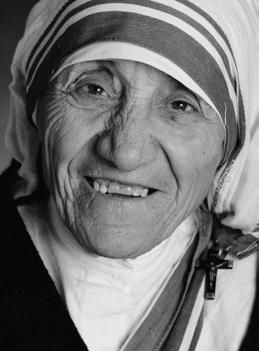
Cardinal Arthur Roche and Archbishop Vittorio Francesco Viola, respectively prefect and secretary of the Dicastery for Divine Worship and the Discipline of the Sacraments, announced the pope’s decision in a decree published by the Vatican Feb. 11.
“Canonized in 2016 by Pope Francis, the name of Teresa of Calcutta continues to shine out as a source of hope for many men and women who seek consolation amidst tribulations of body and spirit,” said the decree, dated Dec. 24.
Previously the feast day of St. Teresa was inscribed only in the proper calendar of the Missionaries of Charity and the proper calendar of India. Now her memorial is included in the calendar of the universal church.
— Catholic News Service and OSV News
CAROL GLATZ Catholic News Service
VATICAN CITY — Pope Francis has urged U.S. Catholics and people of goodwill to not give in to “narratives” that discriminate against and cause unnecessary suffering to migrants and refugees.
“I recognize your valuable efforts, dear brother bishops of the United States, as you work closely with migrants and refugees, proclaiming Jesus Christ and promoting fundamental human rights,” he said in a letter to the U.S. bishops published by the Vatican Feb. 11.
Pope Francis said he was writing because of “the major crisis that is taking place in the United States” with the start of President Donald J. Trump’s “program of mass deportations.”
In his presidential executive order, “Protecting the American people against invasion,” released Jan. 20, Trump said, “Many of these aliens unlawfully within the United States present significant threats to national security and public safety, committing vile and heinous acts against innocent Americans.”
Pope Francis said, “The rightly formed conscience cannot fail to make a critical judgment and express its disagreement with any measure that tacitly or explicitly
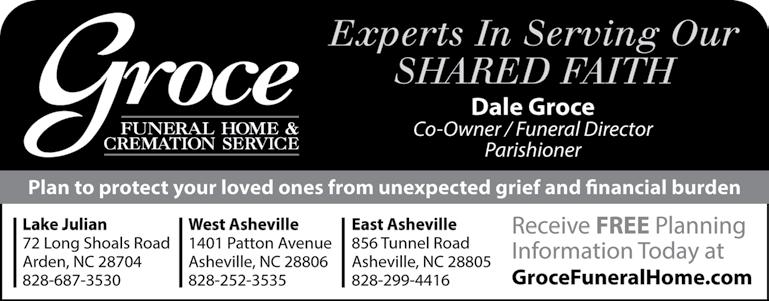

reward all that you do for the protection and defense of those who are considered less valuable, less important or less human!”
“I exhort all the faithful of the Catholic Church, and all men and women of goodwill, not to give in to narratives that discriminate against and cause unnecessary suffering to our migrant and refugee brothers and sisters,” he wrote.
“With charity and clarity we are all called to live in solidarity and fraternity, to build bridges that bring us ever closer together, to avoid walls of ignominy and to learn to give our lives as Jesus Christ gave his for the salvation of all,” the pope wrote.
In his letter, the pope said every nation has the right to defend itself and keep its communities safe “from those who have committed violent or serious crimes while in the country or prior to arrival.”
However, he continued, “the act of deporting people who in many cases have left their own land for reasons of extreme poverty, insecurity, exploitation, persecution or serious deterioration of the environment, damages the dignity of many men and women, and of entire families, and places them in a state of particular vulnerability and defenselessness.”
“This is not a minor issue,” he wrote. “An
authentic rule of law is verified precisely in the dignified treatment that all people deserve, especially the poorest and most marginalized.”
“What is built on the basis of force, and not on the truth about the equal dignity of every human being, begins badly and will end badly,” the pope warned.
While the pope did not name specific U.S. policies, his letter emphasized the Catholic Church’s longstanding closeness to and support of migrants and refugees.
At a time that is “so clearly marked by the phenomenon of migration,” the pope reaffirmed “not only our faith in a God who is always close, incarnate, migrant and refugee, but also the infinite and transcendent dignity of every human person.”
These words, he said, “are not an artificial construct.” Even a quick look at the Church’s social doctrine over the centuries clearly shows Jesus Christ “did not live apart from the difficult experience of being expelled from his own land because of an imminent risk to his life and from the experience of having to take refuge in a society and a culture foreign to his own.”
“The Son of God, in becoming man, also chose to live the drama of immigration,” he wrote.
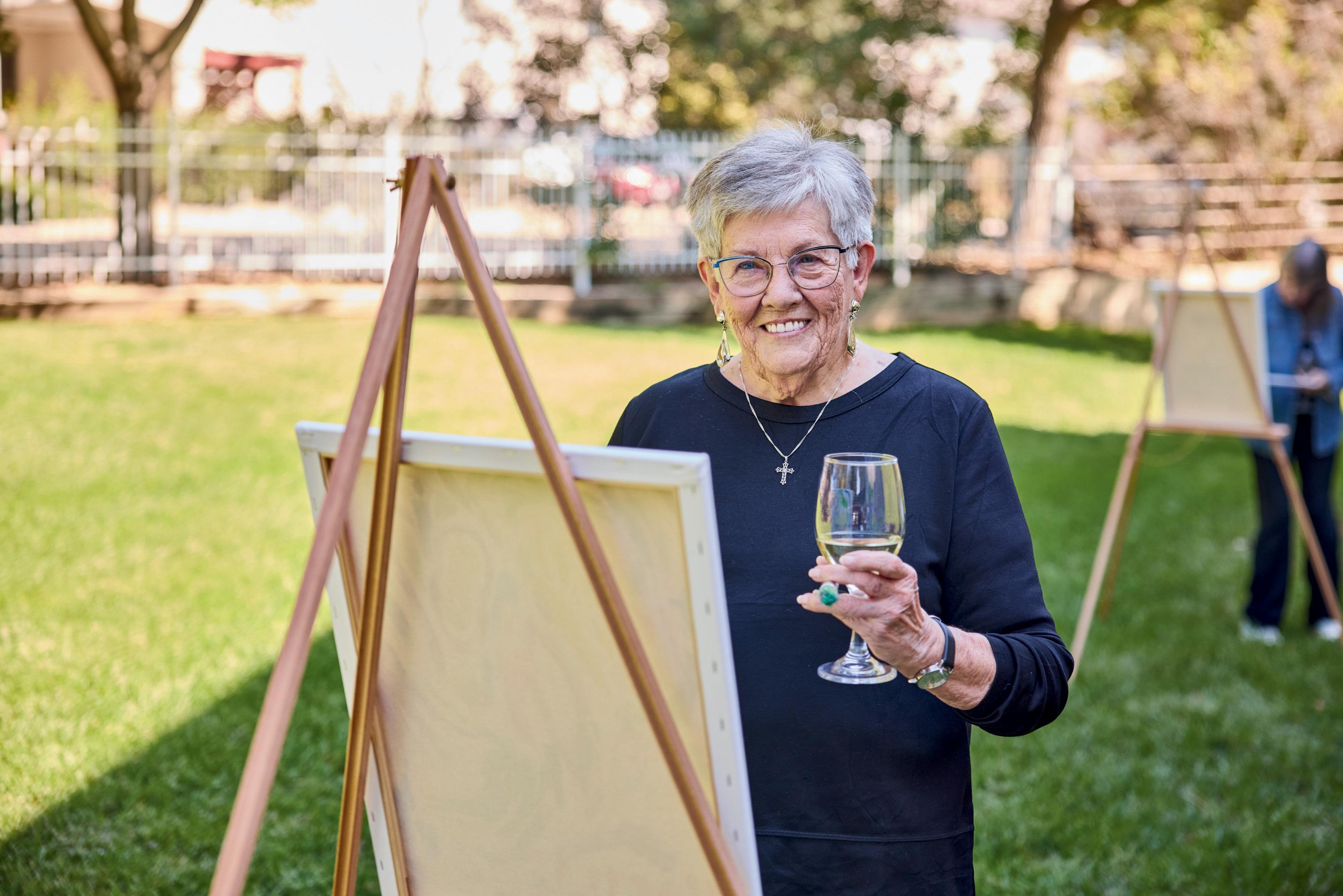



The Catholic News Herald reached the Facebook and Instagram feeds of more than 625,000 people in English and Spanish last month. The most talked about post?

Coverage of the North Carolina bishops’ first joint statement. Join the conversation: www.facebook.com/CatholicNewsHerald.
On YouTube over the past 30 days, videos produced by the Catholic News Herald have been viewed more than 17,000 times. The most popular video? “Bishop Martin launches vision initiative in Charlotte diocese.”
Over the past 20 days, 30,000 visitors to www.catholicnewsherald.com have viewed 52,000 pages.
Join the conversation online

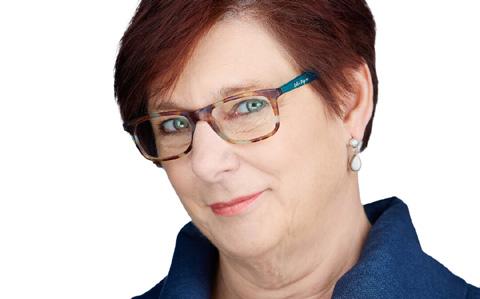
Black History Month is officially observed every February, but there’s something unfortunate about that. Don’t get me wrong. It’s great to recognize the contributions of Black Americans. But dedicating a specific month to doing so seems to have had the unintended side effect of limiting the recognition they’ve earned to a paltry 28 days of the year.
Here in New Orleans, the gifts of Black Americans are more visible than they are in other places. Flavorful food, soulful music, deep community and lively joy: Nearly everything both locals and visitors love about our city has roots in Black culture, beautifully expressed.
Louisiana’s story of colonialism, race and culture is unique and complex. New Orleans bears the tragic distinction of having had the largest slave market in North America. But at the same time, the city was also home



We proclaim Christ to the world around us by our efforts to provide a safe environment for all people, especially the young and the vulnerable.

The Catholic Church is absolutely committed to the safety of children. Together we can make a Promise to Protect and a Pledge to Heal.
Suspect sexual abuse or misconduct?
If you have information about possible sexual abuse or misconduct by any clergy, employee or volunteer of the Diocese of Charlotte, report concerns safely, securely and anonymously 24/7 over the phone using the diocese’s new hotline, 1-888-630-5929, or online: www.RedFlagReporting.com/RCDOC
Please note: If you suspect a child is in danger, please contact 9-1-1 or your local law enforcement agency.
Safe Environment training
Every Church worker must go through abuse prevention and education training. Find more information about the Diocese of Charlotte’s Safe Environment program, sign up for Protecting God’s Children training and more: Go to www.charlottediocese.org and click on “Safe Environment”
For more information or questions, please contact the diocese’s Safe Environment Office: www.safeenvironment@rcdoc.org or 704-370-3222
‘This thriving community had a lasting impact on New Orleans and well beyond it.’
to the largest community of free Black people, a community few Americans even know existed.
Most free people of color were Frenchspeaking Catholics. Some arrived in New Orleans already free, while others purchased their freedom or acquired it through government or military service or manumission (being freed by slave owners).
A middle class of merchants and skilled artisans, free people of color attended school, owned property and were able to build generational wealth. By 1810, free people of color were 29% of the city’s population. They lost many of the freedoms they had enjoyed under French and Spanish rule when the United States purchased Louisiana in 1803. Nevertheless, this thriving community had a lasting impact on New Orleans and well beyond it.
As restrictions increased and the imposition of Americanized racial policies took hold in the 1830s and 1840s, free people of color created their own religious, cultural, mutual aid and educational institutions. Their examples are inspiring.
When Henriette Delille (1812-1862) had a religious experience at the age of 24, she believed that God was calling her to religious life. Although she was well
educated and had been born free, women of color were disqualified from joining the established orders. Instead, Henriette and seven other young women founded a community that later became known as the Sisters of the Holy Family. Permitted to take only private vows and prohibited from wearing a habit, the sisters cared for the sick, helped the poor and taught both free and enslaved children. They took elderly women into their home and established the first Catholic nursing home in the United States. Mother Henriette served as godmother to hundreds of newly baptized Catholics, and her influence is still felt here. She was declared venerable in 2010. Eugène Warburg (1825-1859) was born into slavery but was freed as a young child by his Jewish father. He apprenticed as a marble cutter under a French artist, then established his own sculpture studio in the French Quarter. Warburg earned commissions for religious statuary, portraits and gravestones. The checkered marble floor he designed and created for the expansion and beautification of St. Louis Cathedral in 1850 still testifies to the quality and precision of his work.
Edmond Dédé (1827-1901), a fourthgeneration free man of color, began playing the clarinet as a child, then quickly moved to the violin. He was considered a musical prodigy. Dédé worked as a cigar maker to earn his passage to Europe, and he enjoyed a successful music career in France. He composed many pieces of classical music and was the first African American to compose a full-scale opera. “Music from Morgiane” debuted in 2025 at St. Louis Cathedral, where Dédé was baptized.
CHALLENGE TO SEGREGATION
Homère Plessy (1862-1925), a Frenchspeaking free man of color, grew up during Reconstruction, when Louisiana schools were racially integrated, Black men were able to vote, interracial marriage was legal, and more than 200 Black men held elected office. A lifelong member of St. Augustine Catholic Church, Plessy became politically active when Louisiana began passing Jim Crow legislation. Plessy challenged segregation laws with an act of civil disobedience. He is best known as the unsuccessful plaintiff in the famous Supreme Court decision Plessy v. Ferguson, which established the “separate but equal” legal doctrine that was ultimately overturned in 1954.
The lives of these four free, Black, French-speaking Catholics from 19thcentury New Orleans are worthy of our attention. The nobility of their enduring contributions to American society, despite the difficulties they faced as people of color, is nothing less than miraculous.
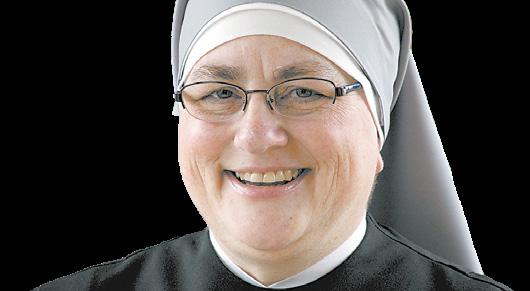
Sister Constance Veit, L.S.P.
For this Jubilee Year the Church has been given a beautiful, multilingual hymn, “Pilgrims of Hope.” If you participate in any Jubilee events, whether local or international, you will no doubt hear the uplifting melody and inspiring lyrics of this hymn.
But Pope Francis has suggested that there is another, quite unexpected hymn at the heart of the Jubilee. In his papal bull calling for the Holy Year, he spoke about the sick, the disabled and those experiencing weaknesses and limitations, calling for the faithful to give them “inclusive” attention.
“Care given to them,” he wrote, “is a hymn to human dignity, a song of hope that calls for the choral participation of society as a whole.”
How can we participate in this hymn of
‘Signs of hope should be shown to the sick, at home or in hospital. Their sufferings can be allayed by the closeness and affection of those who visit them.’
Pope Francis
human dignity, this song of hope? Lucky for us, advanced musicality is not required. It’s much simpler than that. We can lend our voices to this great Jubilee choir, while obtaining the Jubilee Indulgence, by visiting our brothers and sisters in need – the sick, prisoners, lonely seniors and the disabled – “in a sense making a pilgrimage to Christ present in them” (see Mt 25, 34-36).
Let’s allow Pope Francis to inspire us as we join this Jubilee choir of hope.
“Signs of hope should be shown to the sick, at home or in hospital,” he wrote.
“Their sufferings can be allayed by the closeness and affection of those who visit them.”
REMEMBER THE ELDERLY, CAREGIVERS
Naturally, he included the elderly in his thoughts for this year,
“The elderly, who frequently feel lonely and abandoned, also deserve signs of hope” he wrote. “Esteem for the treasure
that they are, their life experiences, their accumulated wisdom and the contribution that they can still make, is incumbent on the Christian community and civil society, which are called to cooperate in strengthening the covenant between generations.”
Pope Francis also encourages us to remember caregivers.
He said, “Gratitude should likewise be shown to all those healthcare workers who, often in precarious conditions, carry out their mission with constant care and concern for the sick and for those who are most vulnerable.”
The celebration of the World Day of the Sick on Feb. 11, with the theme of “Hope does not disappoint (Rm 5:5), but strengthens us in times of trial,” is a wonderful opportunity to begin “singing” in the Jubilee choir of dignity and hope. In his message for the World Day of the Sick, the pope reflects on three ways in which God remains close to those who are suffering: through encounter, gift and sharing.
First, the concept of encounter invites the sick to see their infirmity as an opportunity to encounter our compassionate Lord and appreciate His closeness.
Second, suffering reminds us that hope comes from the Lord as a gift to be received and cultivated.
Third – and this is where we can make our voices heard – places of suffering often become places of sharing and mutual enrichment.
“How often, at the bedside of the sick, do we learn to hope!” the pope writes. “How often, by our closeness to those who suffer, do we learn to have faith! How often, when we care for those in need, do we discover love! We realize that we are ‘angels’ of hope and messengers of God for one another, all of us together: whether patients, physicians, nurses, family members, friends, priests, men and women religious, no matter where we are, whether in the family or in clinics, nursing homes, hospitals or medical centers.”
Whether we are ill or we care for those who are, we have an important part to play in “singing” this year’s Jubilee hymn.
As our Holy Father said, “Your journey together is a sign for everyone: ‘a hymn to human dignity, a song of hope.’ Its strains are heard far beyond the rooms and beds of health facilities and serve to elicit in charity ‘the choral participation of society as a whole’ in a harmony … capable of bringing light and warmth wherever they are most needed.”
So, let’s get started and lend our voices to this symphony through our charity to the sick and the elderly on the World Day of the Sick!
SISTER CONSTANCE VEIT is the communications director for the Little Sisters of the Poor in the United States and an occupational therapist.
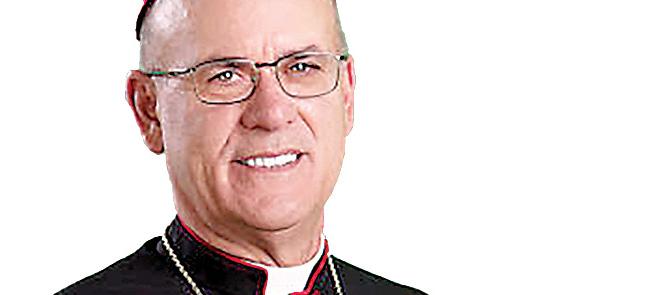
Bishop Kevin C. Rhoades
In recent weeks, President Donald Trump has taken steps to make it easier for immigration officials to conduct enforcement actions in “protected areas” (often referred to as “sensitive locations”), including places of worship. In other words, the U.S. Department of Homeland Security can arrest noncitizens at church, even for non-criminal offenses. Parishioners are afraid.
Reports have emerged of migrant communities who are scared to go to church. There have even been reports of arrests during worship services (Editor’s note: This has not been reported to have occurred in the western half of North Carolina.) While a raid on church property may not be a legal threat to religious liberty in every circumstance, it is certainly a moral one.
People have a duty to offer worship to God. Religious freedom protects the rights of persons to carry out their obligations, ensuring that individuals and communities can fulfill their most sacred duty.
LEADERS MAY REGULATE BORDERS
The government has its own duties. It ought to ensure a just public order and promote the common good. And the Catechism of the Catholic Church teaches that: “Political authorities, for the sake of the common good for which they are responsible, may make the exercise of the right to immigrate subject to various juridical conditions, especially with regard to the immigrants’ duties toward their country of adoption” (CCC, 2241).
In this way, the government has a right and responsibility to regulate international borders and to enforce just immigration laws, including for the protection of existing residents, be they citizens or otherwise.
At the same time, the government’s enforcement of the law cannot come at the expense of human life or without respect for each person’s God-given dignity because the “civil law must ensure that all members of society enjoy respect for certain fundamental rights which innately belong to the person, rights which every positive law must recognize and guarantee” (“Evangelium Vitae,” 71).
While accommodating migration undertaken to preserve human life is a responsibility shared by all countries, the Church has recognized that more prosperous nations are “obliged, to the
extent they are able, to welcome the foreigner in search of the security and the means of livelihood which he cannot find in his country of origin” (CCC, 2241).
Put another way, migrants ought to respect the law and culture of the country that receives them. But at the same time, “political authorities are obliged to respect the fundamental rights of the human person” (CCC, 2237), including the natural right to migrate when “there are just reasons in favor of it” (“Pacem in Terris,” 25).
One of those fundamental rights is the right to religious freedom. To be sure, the right to religious freedom is fundamental but not absolute. Governments may justly limit it for compelling reasons, by no more than is necessary. But to intrude on the right to fulfill our duties to God is a grave judgment that must be guided by prudence rather than the political winds.
The Church’s declaration on religious freedom teaches: “Government is … to help create conditions favorable to the fostering of religious life, in order that the people may be truly enabled to exercise their religious rights and to fulfill their religious duties” (“Dignitatis Humanae,” 6).
The action taken by the administration to no longer recognize the concept of protected areas in the course of immigration enforcement (which even under the prior guidance was not absolute) does not foster favorable conditions for the free exercise of religion. Indeed, by creating a climate of fear and uncertainty around the right to go to church, such action undermines those conditions.
All Catholics and others of goodwill in our country, regardless of their ideas about the best way to enforce immigration laws, should be unified in the conviction that people must be free to fulfill their duties to God without fear. And our immigration authorities, having now been handed very broad discretion over whether to intrude on sacred spaces, should bear in mind the gravity of such a decision.
As pastors, the bishops of the United States are committed to walking with all people who seek to fulfill their duty to worship the Lord.
BISHOP KEVIN C. RHOADES is the bishop of the Diocese of Fort Wayne-South Bend, Indiana and chairman of the U.S. Conference of Catholic Bishops’ Committee for Religious Liberty.

At Catholic Charities, we believe volunteering is a holy act of love and service. By answering Christ’s call to care for those in need, you can use your time and talents to bring God’s light and grace to the lives you touch.